All products featured are independently chosen by us. However, SoundGuys may receive a commission on orders placed through its retail links. See our ethics statement.
Best wireless earbuds under $200
Published onOctober 28, 2024


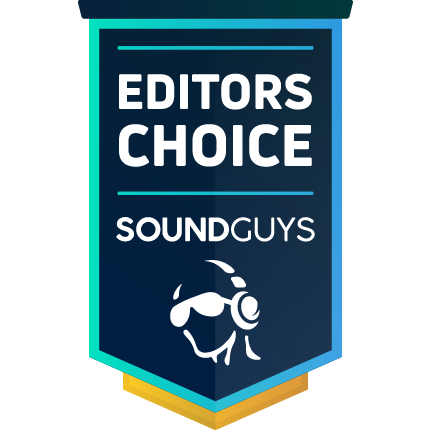




Take SoundGuys’ quiz to find your best fit
True wireless earbuds, aka wireless earbuds, look like the future. In fact, they look like the kind of future with jetpacks and hoverboards that actually work, and now that wireless tech has matured, you can snag a pair of buds on any budget. With improvements to Bluetooth stability and ergonomics, it’s no wonder folks are shedding cables before ditching wheels. These are the best wireless earbuds under $200 that can bring the future to you today.
Best overall wireless earbuds under $200: Anker Soundcore Liberty 4 Pro
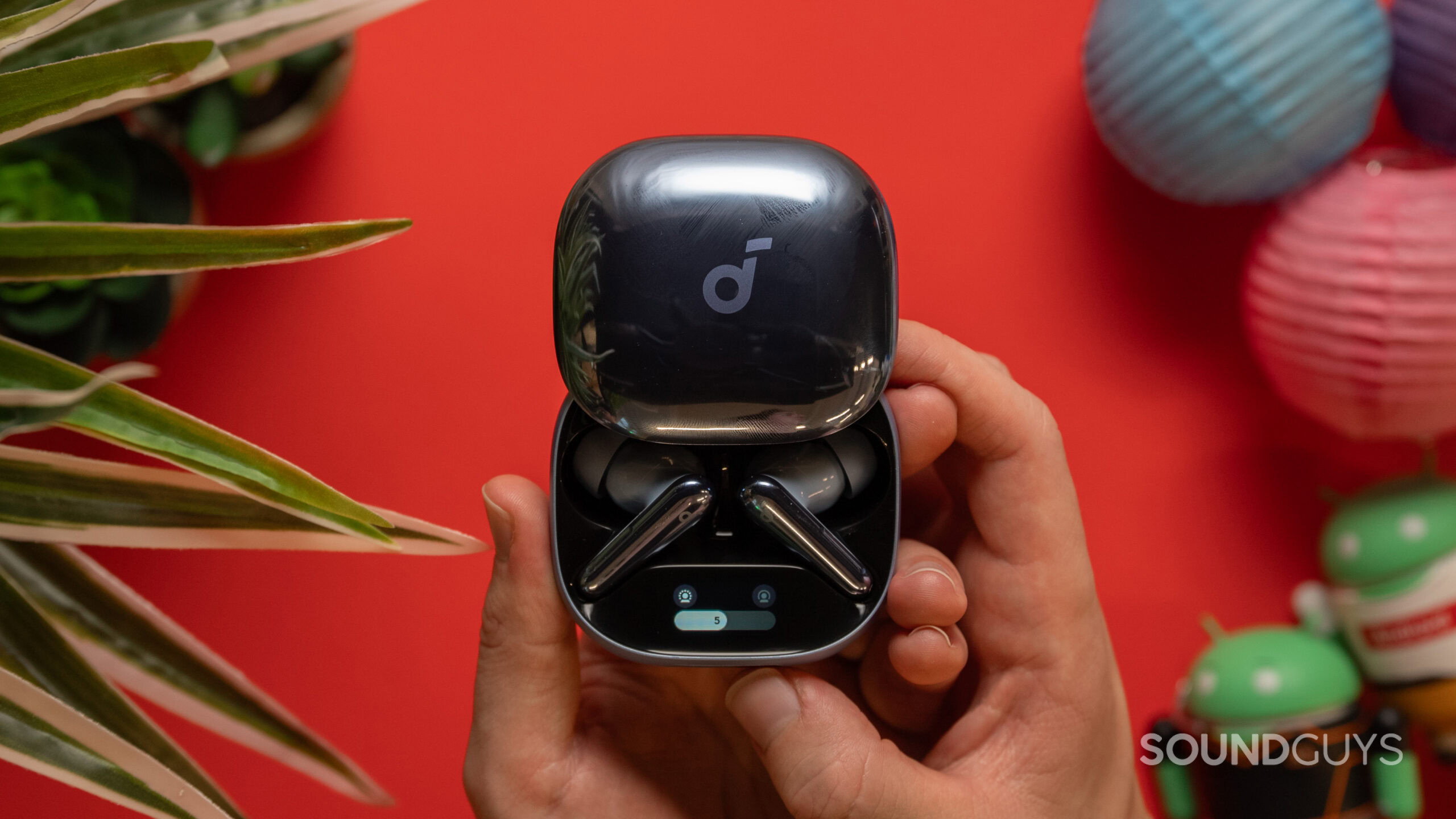
Reasons to Buy:
- Excellent sound quality with customizable EQ
- Good ANC
- Extensive features and customization via companion app
- Bluetooth 5.4 with LDAC support for high-res audio
- Comfortable fit with multiple ear tip options
- Fast charging
- Competitive price at $129.9
Reasons Not to Buy:
- The touchscreen on the case design may be gimmicky for some
- The case exterior is prone to fingerprints
- Spatial audio performance is subpar
- Some features require account creation in the app
The Anker Soundcore Liberty 4 Pro stand out as an exceptional value in the wireless earbud market, offering a wealth of features typically found in more expensive models. These earbuds deliver impressive sound quality that closely follows ideal acoustic preferences, with the added benefit of extensive EQ customization options in the companion app.
With their combination of good sound, effective ANC, and a plethora of features at an affordable price point, the Liberty 4 Pro are hard to beat in the sub-$150 category.
The ANC reduces low-frequency noise by about 30dB, which is impressive for this price range. The transparency mode is equally effective, allowing for clear conversations without removing the earbuds.
One of the Liberty 4 Pro’s standout features is its companion app, which offers a staggering array of customization options. From personalized sound profiles to adjustable ANC levels and customizable controls, users can tailor the earbuds to their exact preferences.
While the unique charging case with its small display and touch controls is an interesting addition, it may be more of a novelty than a practical feature for many users. However, the case does support fast charging, providing up to 4 hours of playback from just a 5-minute charge.

Quick Specs:
- Battery life: 7.5 hours (ANC on), up to 30 hours with case (ANC on), up to 40 hours (ANC off)
- Fast charging: 5 minutes = 4 hours of playback
- Connectivity: Bluetooth 5.4 (SBC, AAC, LDAC), Multipoint
- Protected against: Water-resistant (IPX5)
- Weight: 5.5g per earbud, 51g for case
Loading chart ...
The Liberty 4 Pro emphasizes bass frequencies below 200Hz more. Those who love thumping bass will enjoy this, while others can easily remedy it using the custom equalizer. Across the mids and highs, the Liberty 4 Pro follows our curve quite closely.
The JBL Live Beam 3 has the best features for under $200
Reasons to Buy:
- Innovative smart case with display and controls
- Extensive customization via companion app
- Multipoint connectivity
- Excellent microphone quality for calls
- Comfortable fit for most users
- Qi wireless charging support
Reasons Not to Buy:
- ANC performance is not best-in-class
- Short nozzles may cause fit issues for some
- App required to access many features
- Firmware updates can be time-consuming
The JBL Live Beam 3 brings an impressive array of features to the sub-$200 wireless earbud market. These earbuds stand out with their innovative smart charging case, which features a touch display for controlling playback, ANC modes, and various other functions without needing to use your phone.
If you want to get earbuds with all of the latest features and a few unique ones, the JBL Live Beam 3 are it.
Sound quality is a strong point, with a consumer-friendly tuning that emphasizes bass and treble. The earbuds offer multiple EQ presets, including a “Studio” mode for those preferring a more balanced sound. Active noise cancelation is effective, particularly for low-frequency sounds, making these suitable for commutes and travel. The transparency mode also performs well for staying aware of your surroundings.
Overall, the JBL Live Beam 3 offers an impressive package for tech enthusiasts who want cutting-edge features in their earbuds, backed by solid sound quality and comfort.


- Battery life: 8 hours and 14 minutes
- Connections: Bluetooth 5.3, SBC, AAC, LDAC, and LC3
- Water resistance: IP55
- Weight: 4.9g per earbud
Loading chart ...
The JBL Live Beam 3’s sound is characterized by strong bass, emphasized highs, and some odd things going on in the upper bass. Though this is very much a consumer-friendly sound, it’s not exactly what you want for critical listening — which is not a problem for anyone looking at these earbuds.
The chart below shows how the sound of the JBL Live Beam 3 was assessed by the Multi-Dimensional Audio Quality Score (MDAQS) algorithm from HEAD acoustics.
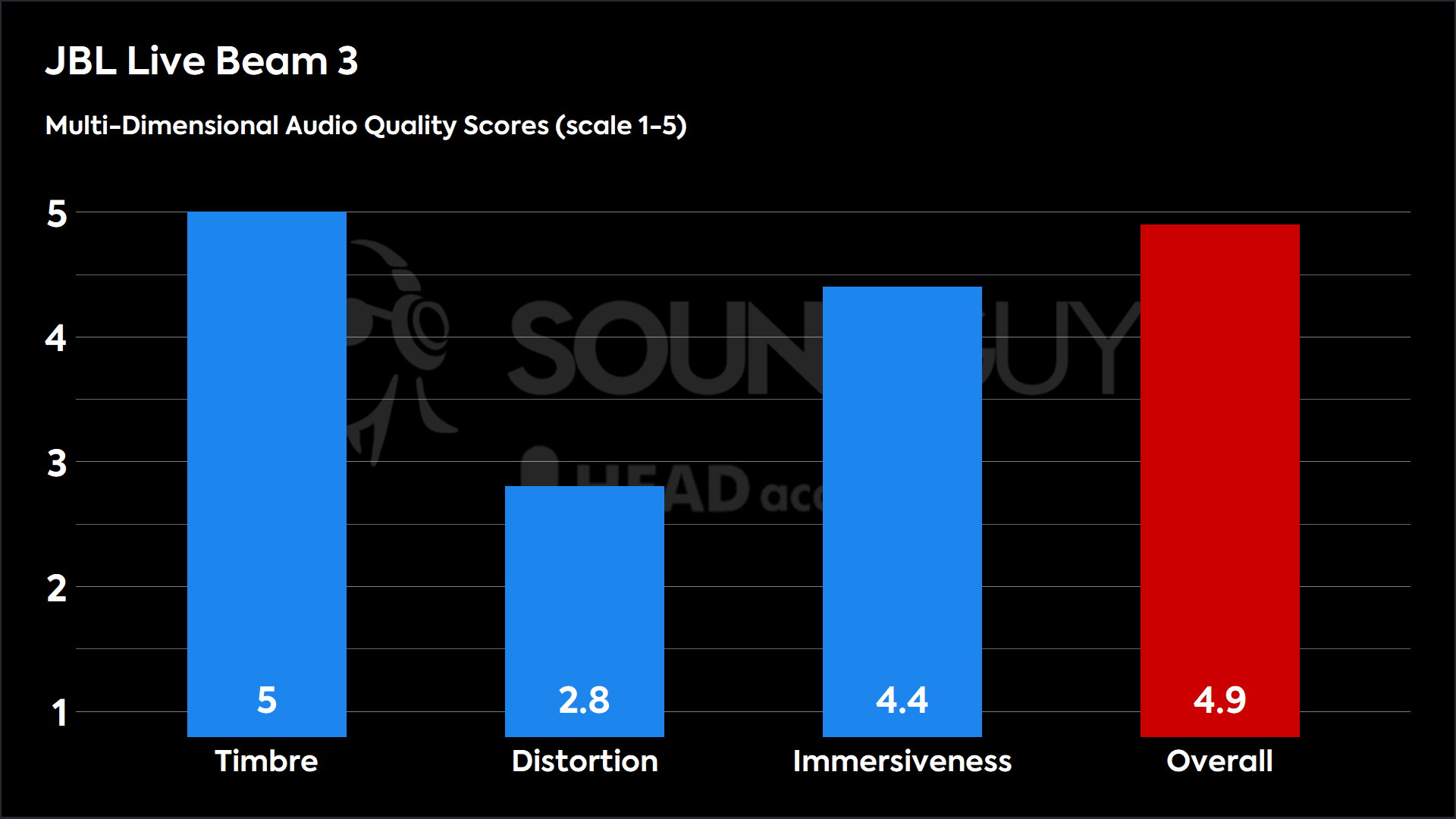
As the JBL Live Beam 3 is a set of earbuds meant to go with you everywhere, it’s no surprise that they have a mic array that will allow you to handle phone calls. Take a listen below:
JBL Live Beam 3 microphone demo (Ideal conditions):
The Samsung Galaxy Buds 2 Pro has the best ANC
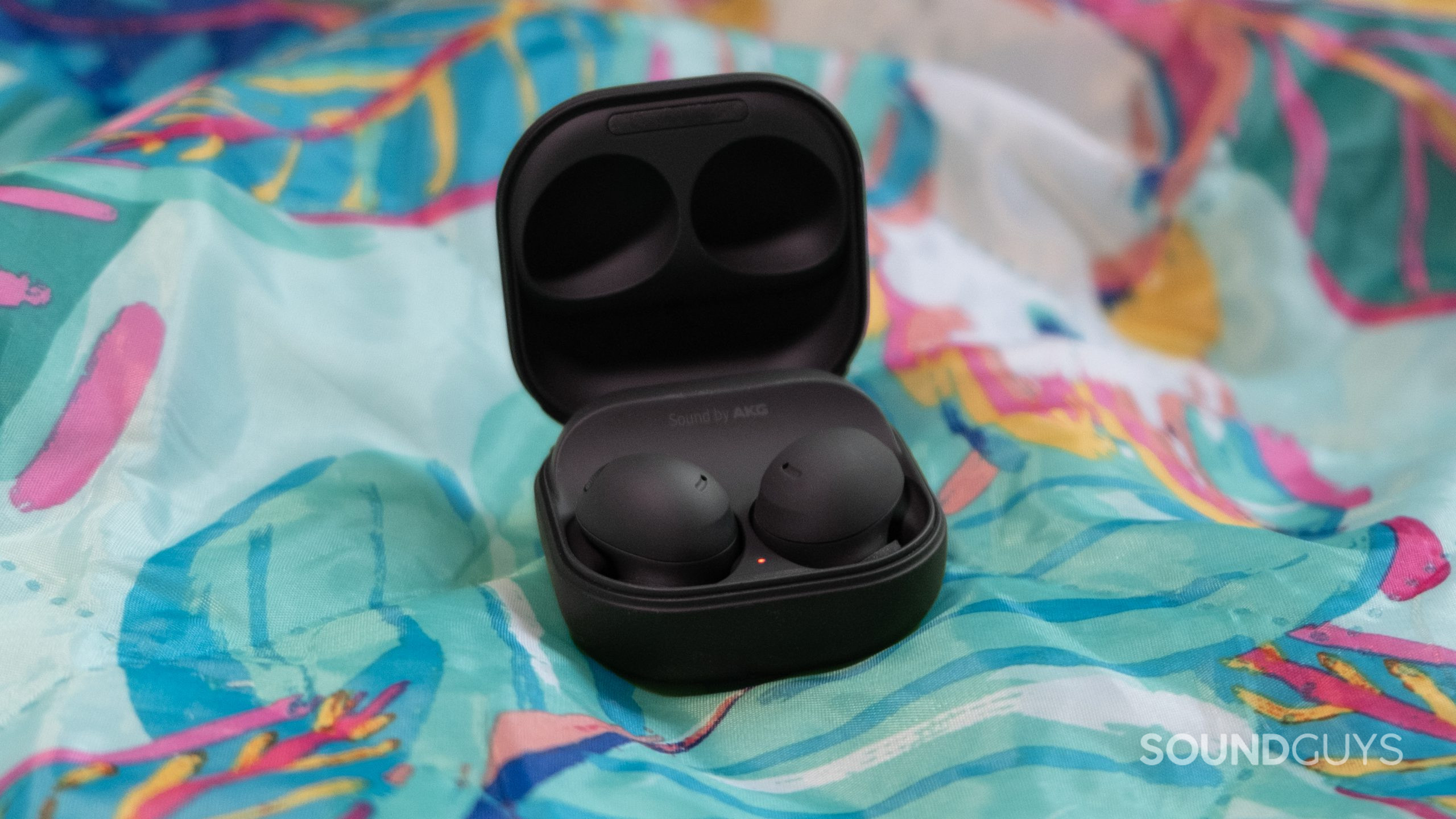
Reasons to Buy:
- Excellent active noise cancelation, especially for low frequencies
- Comfortable fit for long listening sessions
- Good sound quality with AKG tuning
- Intelligent Conversation Mode for easier interactions
- Wireless PowerShare feature for Samsung phone owners
- 360 Audio support for compatible content
Reasons Not to Buy:
- Limited functionality with non-Samsung devices, especially iPhones
- No custom EQ option; only presets are available
- The charging case is prone to scratches
- Limited control customization options
If you have an Android phone, there’s a good chance it’s a Samsung phone. Much like how iPhone users default to the AirPods Pro, it should follow that Samsung users get the Samsung Galaxy Buds 2 Pro. For one, you benefit from the Samsung Seamless Codec, which constantly adjusts for quality and stability and potentially offers 24-bit audio. All other users get their pick of AAC or SBC.
If you have a Samsung phone, the Galaxy Buds 2 Pro brings plenty of ecosystem advantages.
These earbuds excel at canceling low-frequency noise, making them ideal for commutes and noisy environments. The Galaxy Buds Pro suits a commute well. Meanwhile, the sound profile works well with most music. It has a reasonable dose of bass and a strong emphasis on higher frequencies, making it consumer-friendly. The app also includes EQ presets, so you can find one that suits your tastes.
Comfort is a strong point, with the earbuds feeling lightweight and comfortable for extended wear. The touch controls are responsive and no longer have the oversensitivity of previous iterations. Now that these earbuds are a couple of years old, they can regularly be found on discounts for less than $200.

- Battery life: 4 hours 50 minutes (ANC on)
- Connections: Bluetooth 5.3, SBC, AAC, Samsung Seamless Codec
- Water resistance: IPX7
- Weight: 5.5g per earbud
Loading chart ...
The frequency response generally apes our curve through the mids, which is great for the fundamentals and is not far from our own target curve.
The chart below shows how the sound of the Samsung Galaxy Buds 2 Pro was assessed by the Multi-Dimensional Audio Quality Score (MDAQS) algorithm from HEAD Acoustics.
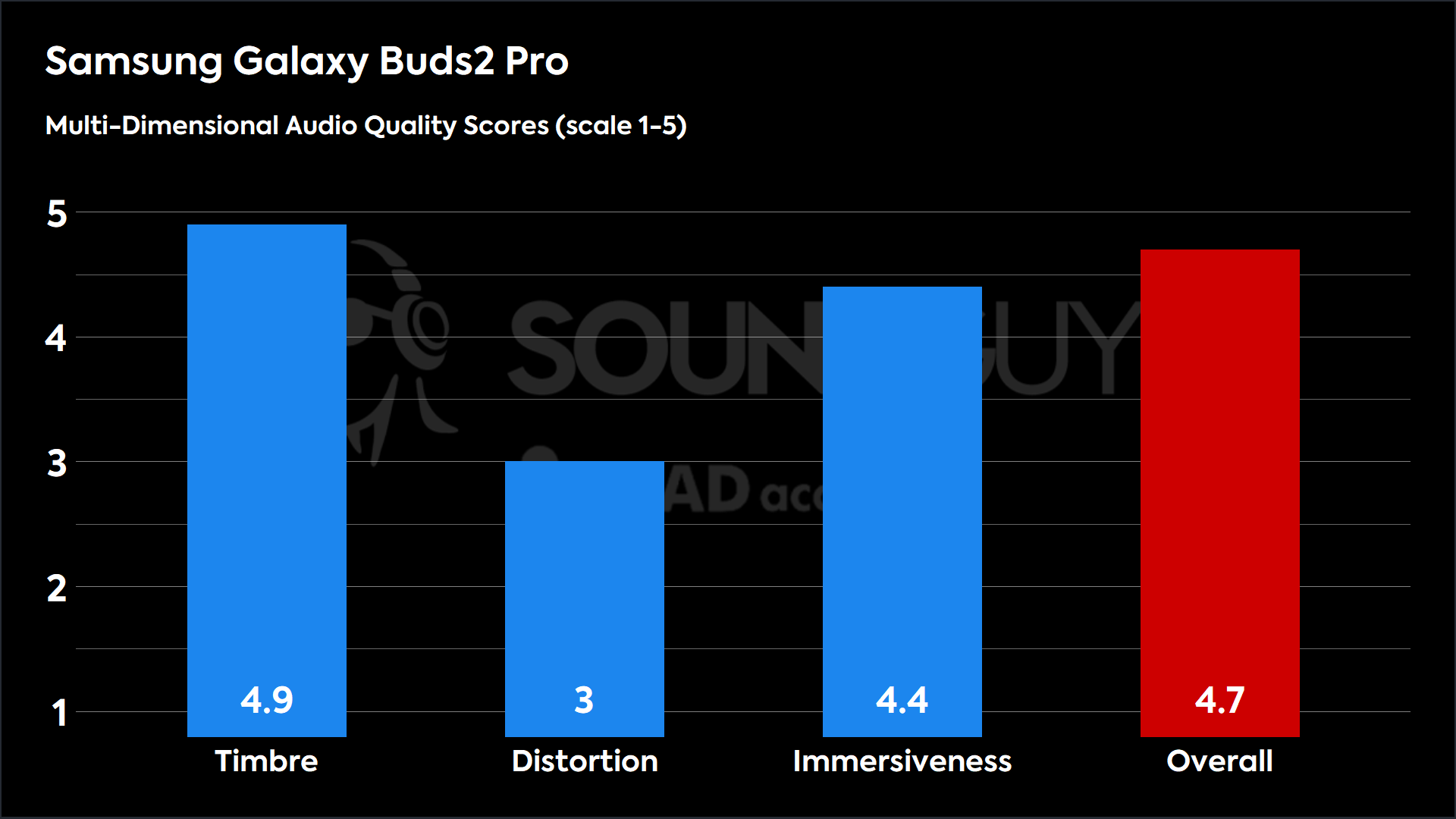
While the audio captured by the Galaxy Buds 2 Pro microphone rejects noise reasonably well, for example, in our wind sample below, voices don’t sound consistently natural. For a phone call or meeting, the mic performs fine. You can toggle on Ambient sound mode, like a makeshift sidetone, to make phone calls more comfortable as well.
As of early 2023, you can record binaural audio with the Galaxy Buds 2 Pro when paired to a Samsung device running One UI 5.0 or later. Basically, it’s like having a simplified surround sound recording.
Samsung Galaxy Buds 2 Pro microphone demo (Ideal conditions):
How does the microphone sound to you?
The Samsung Galaxy Buds 2 is a great alternative
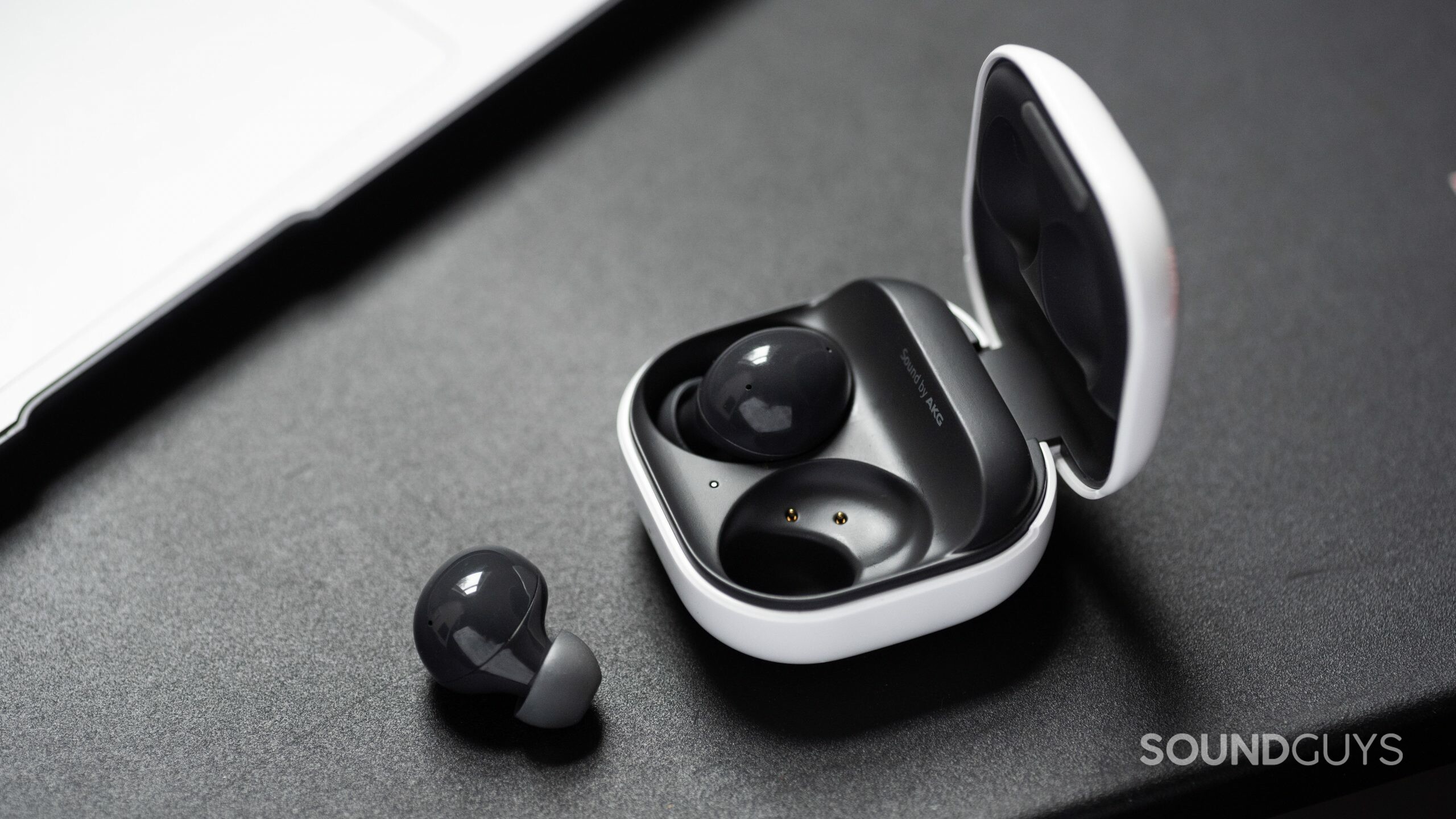
While we love the Galaxy Buds 2 Pro, the fact of the matter is that the Galaxy Buds 2 also have solid noise canceling for less money. If you don’t need all the bells and whistles of the Buds 2 Pro, like the IPX7 rating, we recommend saving for this equally competent set of buds. Of course, you should look at both and see which fits your life better. For example, you’ll compromise on the IPX2 rating and more pared-back settings in the app.
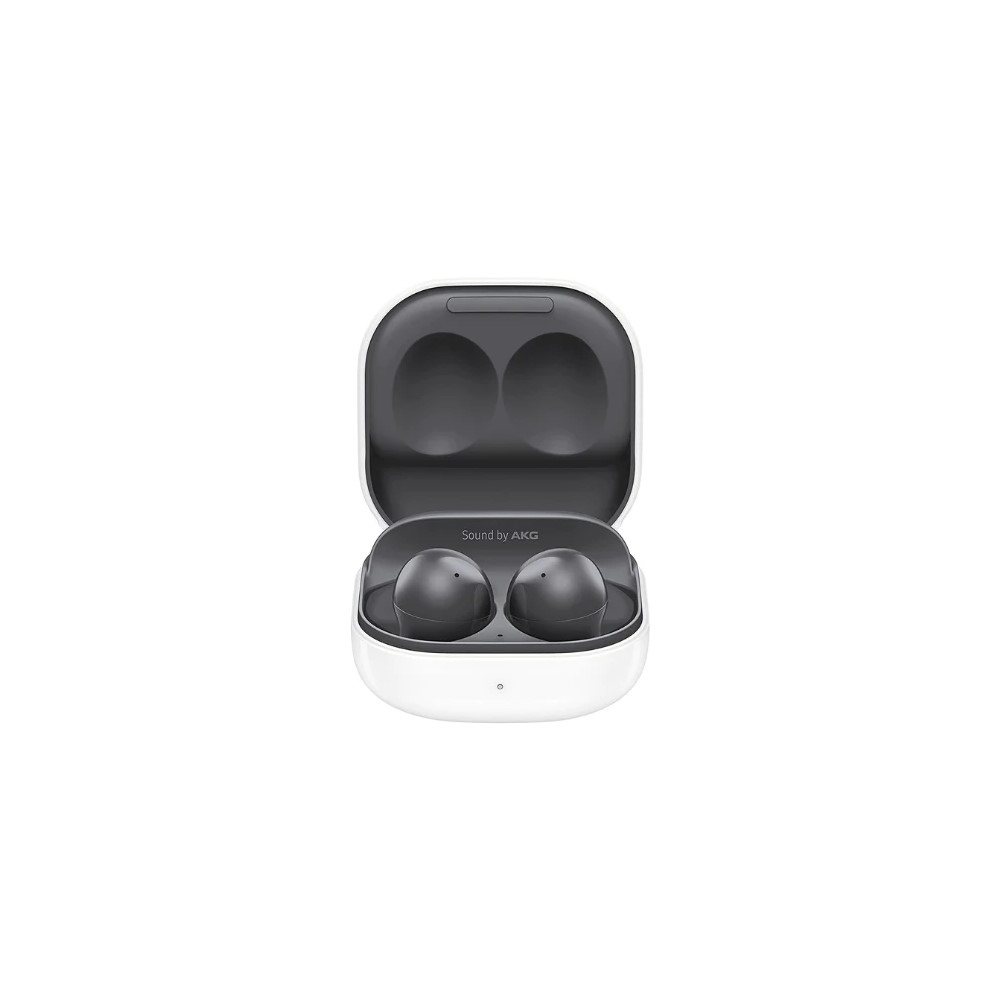
Best wireless earbuds under $200 for iPhone users: Apple AirPods 4 with Active Noise Cancellation
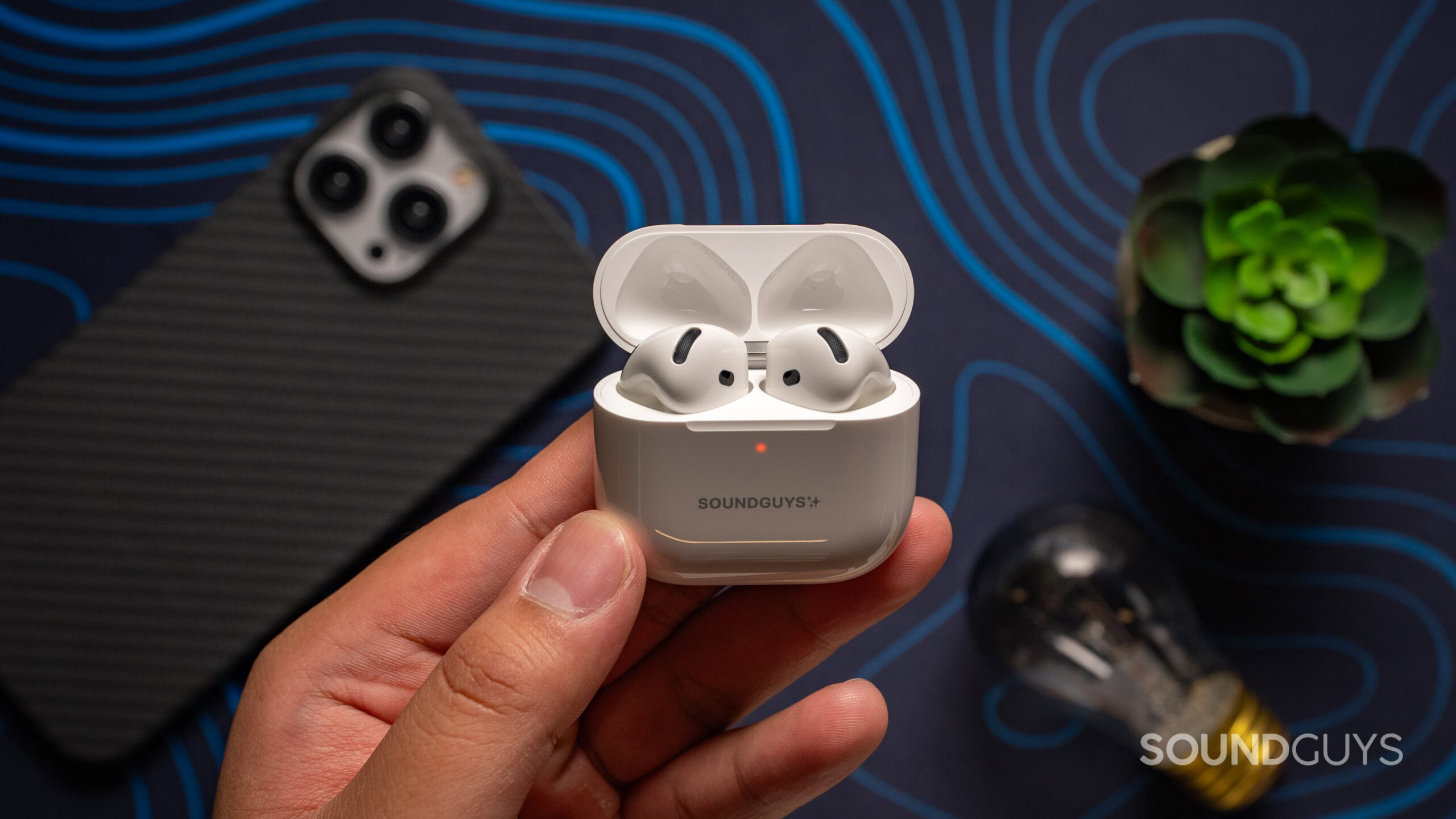
Reasons to Buy:
- Effective ANC for unsealed earbuds
- Seamless integration with iOS devices
- H2 chip for advanced features and connectivity
- Spatial Audio with head-tracking support
- Adaptive Audio and Conversation Awareness features
Reasons Not to Buy:
- The unsealed design may not fit all ears securely
- Limited functionality with non-Apple devices
- No volume controls on earbuds
- Bass response may be lacking for some users
Apple’s fourth-generation AirPods bring ANC technology to the entry-level model for the first time. These earbuds showcase Apple’s prowess in creating a compelling audio experience within an unsealed design, a feat that has challenged many competitors. The earbuds can cancel about 20dB of noise in the mids and highs.
With the addition of ANC and an improved design, the AirPods 4 offer iPhone users a combination of convenience, features, and sound quality in an unsealed earbud.
The redesigned shape of the AirPods 4 aims to provide a more universal fit, though individual experiences may vary. This is complemented by innovative features like Adaptive Audio, which dynamically blends ANC and Transparency mode based on your environment, and Conversation Awareness, which automatically lowers music volume when you start speaking.
Sound quality is decent for unsealed earbuds, with a relatively balanced profile that may lack some sub-bass due to the open design. The H2 chip enables advanced features like Spatial Audio with head tracking, enhancing the immersive experience for compatible content. iOS users will appreciate the seamless integration with their devices, including fast pairing and easy switching between Apple products.
While the AirPods 4 with ANC shine in the Apple ecosystem, they lose significant functionality when paired with non-Apple devices. This, combined with the unsealed design that may not suit all users or situations, are the primary considerations for potential buyers.

Quick Specs
- Battery life: 6 hours, 21 minutes (ANC off); up to 30 hours with case
- Fast charging: 5 minutes = 1 hour of playback
- Connectivity: Bluetooth 5.3 (AAC codec)
- Protected against: Dust and water-resistant (IP54)
- Weight: 4.3g per earbud, 34.7g for case
Loading chart ...
The AirPods 4 with Active Noise Cancellation deviate from our preferences a bit in the upper bass region, presumably to help the low end out a bit assuming an imperfect fit. There is that strange 2kHz overemphasis that makes some sibilant sounds a bit louder than the rest of your music, but in general, the highs are a bit underemphasized from 3kHz on up until 6kHz. It’s tough to predict how you’ll hear this, specifically, but in my listening this underemphasis didn’t seem to do much but make some sounds less clear.
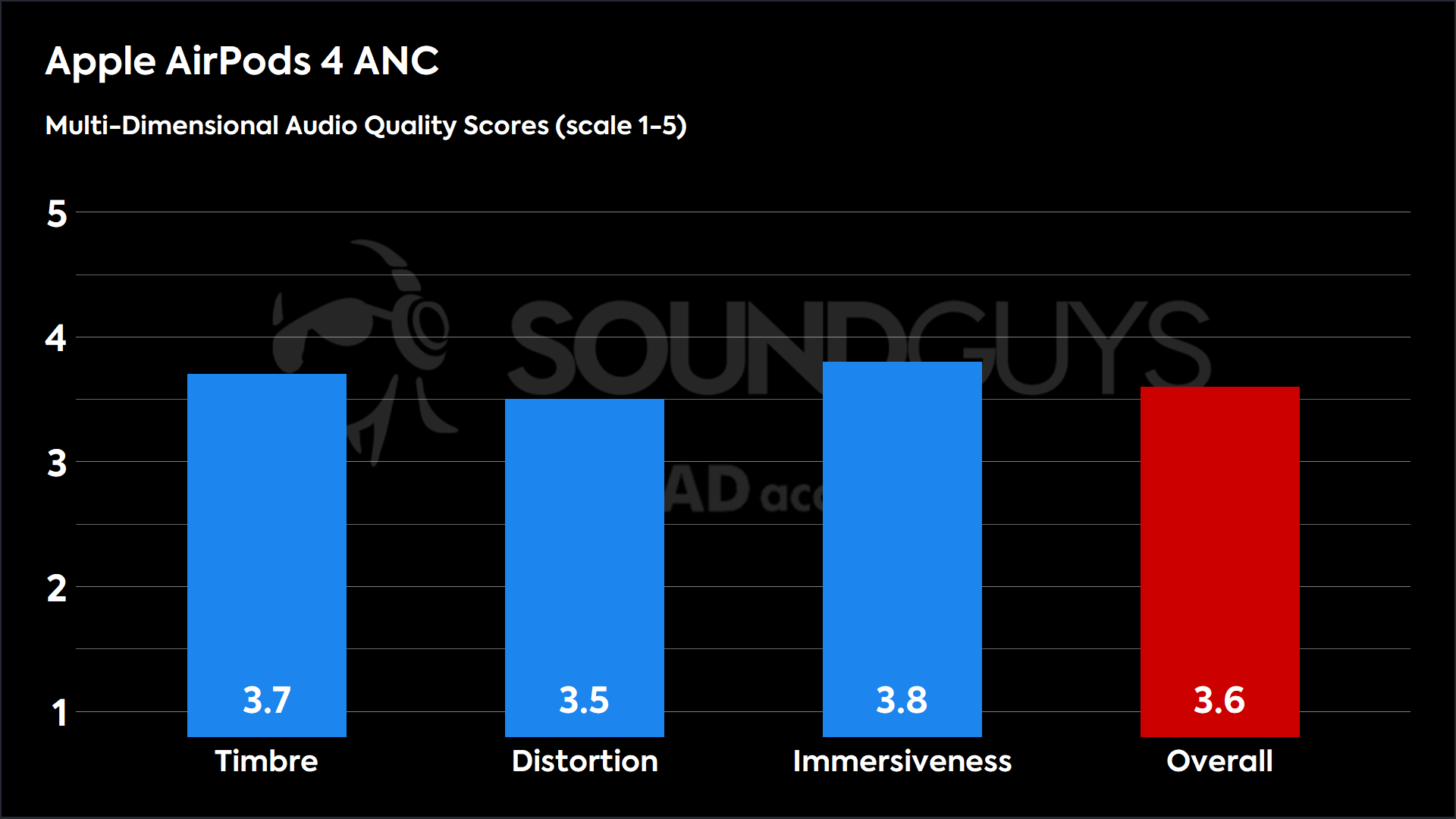
The overall mean opinion score (MOS) of the Apple AirPods 4 with Active Noise Cancellation is 3.6, which simply means most people will be okay with the sound. This is far from a poor result, especially for unsealed earbuds.
The Creative Aurvana Ace 2 has the best sound quality
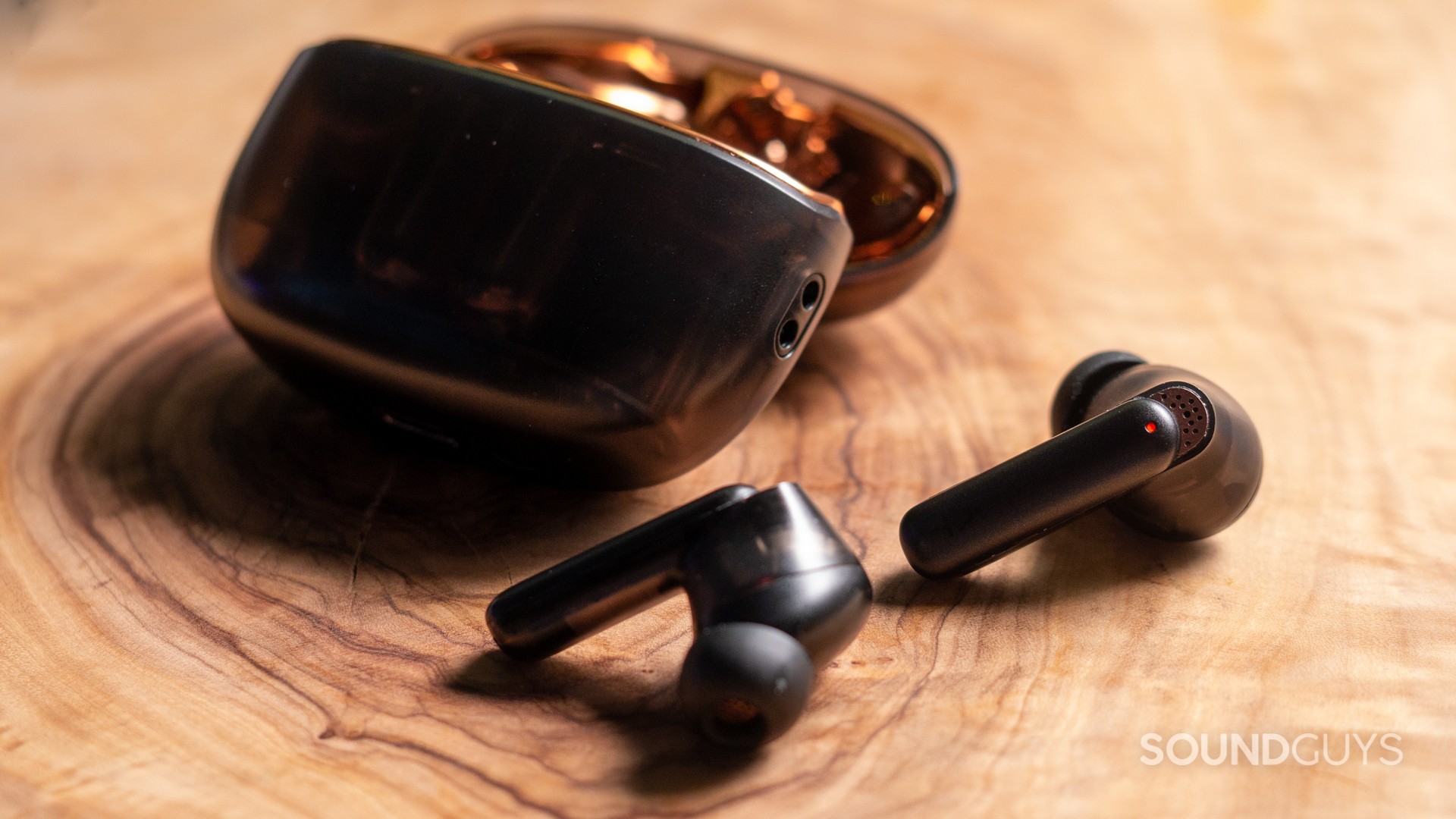
Reasons to Buy:
- Excellent sound quality with xMEMS drivers
- Support for high-quality codecs, including aptX Lossless
- Lightweight and comfortable design
- Full parametric EQ in the companion app
- Competitive price point for the features offered
- Multipoint connectivity
Reasons Not to Buy:
- Active noise cancelation is only mediocre
- No auto play/pause feature when removing earbuds
- Limited color options
- Basic companion app with few features beyond EQ
- No spatial audio or advanced durability features
- Fast charging is slower compared to some competitors
The Creative Aurvana Ace 2 wireless earbuds are an impressive contender in the sub-$200 category, particularly for those prioritizing sound quality. At $150, these earbuds feature a dual-driver system with xMEMS speakers, offering audio fidelity that appeals to audiophiles. They support the latest Bluetooth 5.3 technology and codecs such as LC3, LE, and apt-X Lossless via Snapdragon Sound, ensuring high-quality streaming and future-proof connectivity. The Creative app complements the hardware with a parametric equalizer, allowing users to tailor the sound profile to their preferences.
The xMEMS driver system sounds excellent, and you can customize the sound using the Creative app.
Despite their sound prowess, the Aurvana Ace 2 has its limitations. The noise canceling capability is only mediocre, and the absence of auto play/pause functionality may detract from the user experience for some. However, these earbuds stand out for their unique design, lightweight and comfortable fit, and the inclusion of IPX5 water resistance, making them versatile for everyday use. The battery life is adequate, with over 24 hours of total playback time when factoring in the charging case, and the earbuds offer fast charging for quick top-ups. Given these features and their price point, the Creative Aurvana Ace 2 represents a compelling option for those seeking high-quality sound without breaking the bank.


- Battery life: 6 hours and 13 minutes on a single charge (up to 24 hours total with the charging case)
- Connectivity: Bluetooth 5.3 with support for LC3, LE, aptX Lossless, aptX Adaptive, AAC, and SBC codecs
- Protected against: IPX5 water resistance rating
- Weight: 4.7g per earbud
Loading chart ...
While the Creative Aurvana Ace 2 frequency response closely follows our preference curve in the mids and highs, it strays in the low frequencies. From 300Hz and lower, there is a significant bass boost, as shown in the chart.
The chart below shows how the sound of the Creative Aurvana Ace 2 was assessed by the Multi-Dimensional Audio Quality Score (MDAQS) algorithm from HEAD Acoustics.
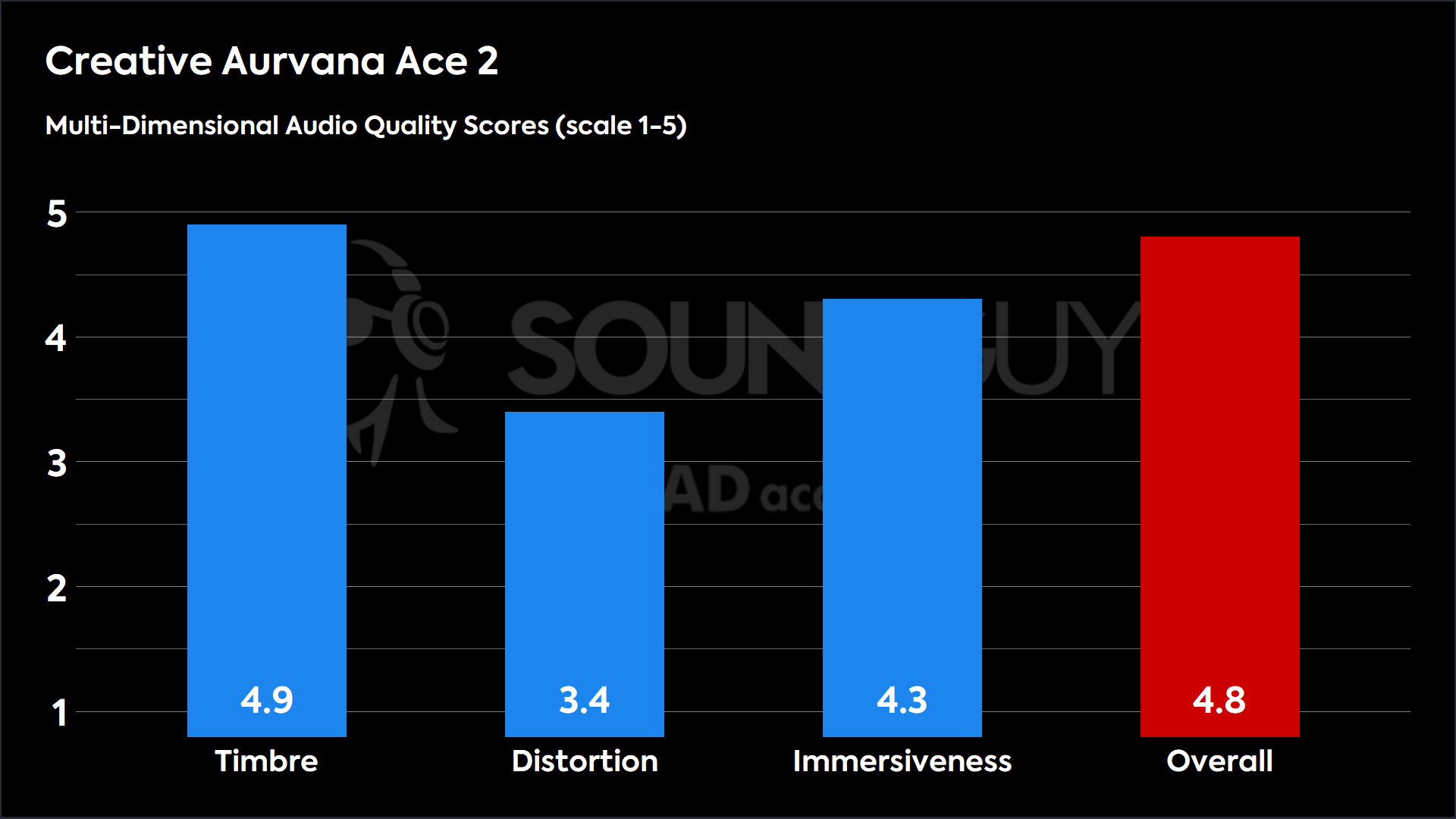
Best earbuds for $200: JLab Epic Lab Edition
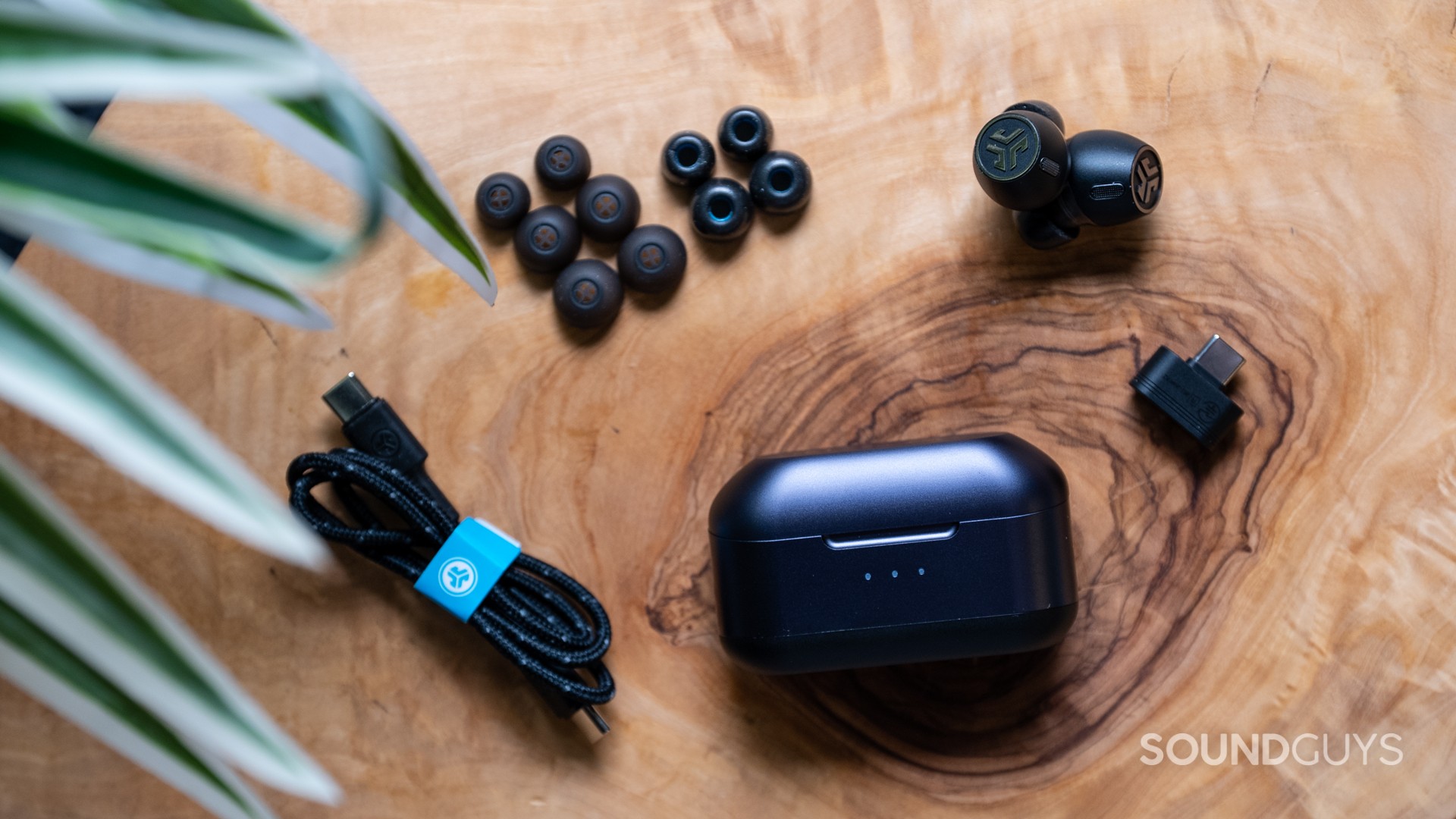
Reasons to Buy:
- Excellent sound quality with Knowles balanced armature drivers
- Competitive price point for feature set
- USB-C dongle included for non-Bluetooth connections
- Customizable controls and EQ via user-friendly app
- Multiple ear tip options (silicone and memory foam)
- Compatible with Dolby Atmos, Windows Sonic, and Tempest 3D AudioTech
Reasons Not to Buy:
The JLab Epic Lab Edition offers flagship features for $200. These earbuds deliver excellent sound quality thanks to their hybrid driver arrangement developed in partnership with Knowles. With a strong bass response and clear highs, they cater to most listeners’ preferences.
Key features include effective active noise cancelation, a transparency mode, and support for high-quality codecs like LDAC and LC3. The earbuds also offer Bluetooth Multipoint, wireless charging, and a unique USB-C dongle for lag-free PC audio.
While the earbuds are on the larger side, they remain comfortable for most users. The companion app provides a user-friendly interface with a 10-band EQ and customizable touch controls.


The JLab Epic Lab Edition may not match the absolute best in ANC performance, but it offers a compelling package of features, sound quality, and value that’s hard to beat in this price range.
- Battery life: 8 hours 46 minutes (earbuds), additional charges from case
- Connections: Bluetooth 5.3, SBC, AAC, LDAC, LC3
- Water resistance: IP55
- Weight: 5.4g per earbud
Loading chart ...
The default tuning for the JLab Epic Lab Edition highlights that people really like bass, as the earbuds bump it up between 2-6dB over our preference curve. However, that doesn’t seem to impact the experience negatively — it’s more of a taste thing.
Out of the box, the tuning provided by JLab is one of the best we’ve seen in terms of MOS-Timbre. The earbuds are also very good at the illusion of 3D space in the stereo mix. Unfortunately, the overall score takes a healthy whack because of the distortion score; though this is a good result, it’s still disappointing.
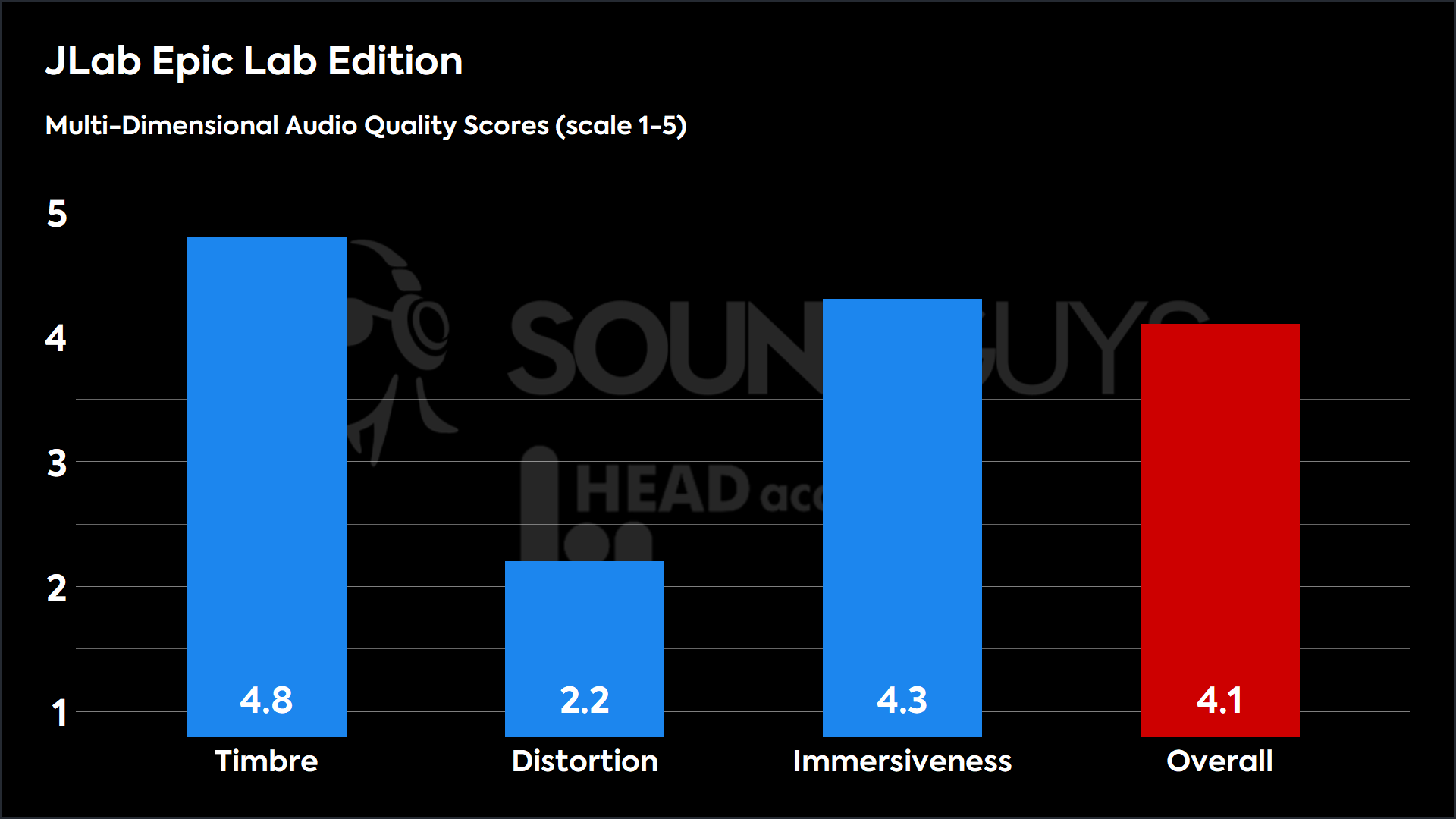
The JLab Epic Lab Edition microphone performs well. Take a listen below:
JLab Epic Lab Edition microphone demo (Ideal conditions):
The best bang for your buck is the Nothing Ear
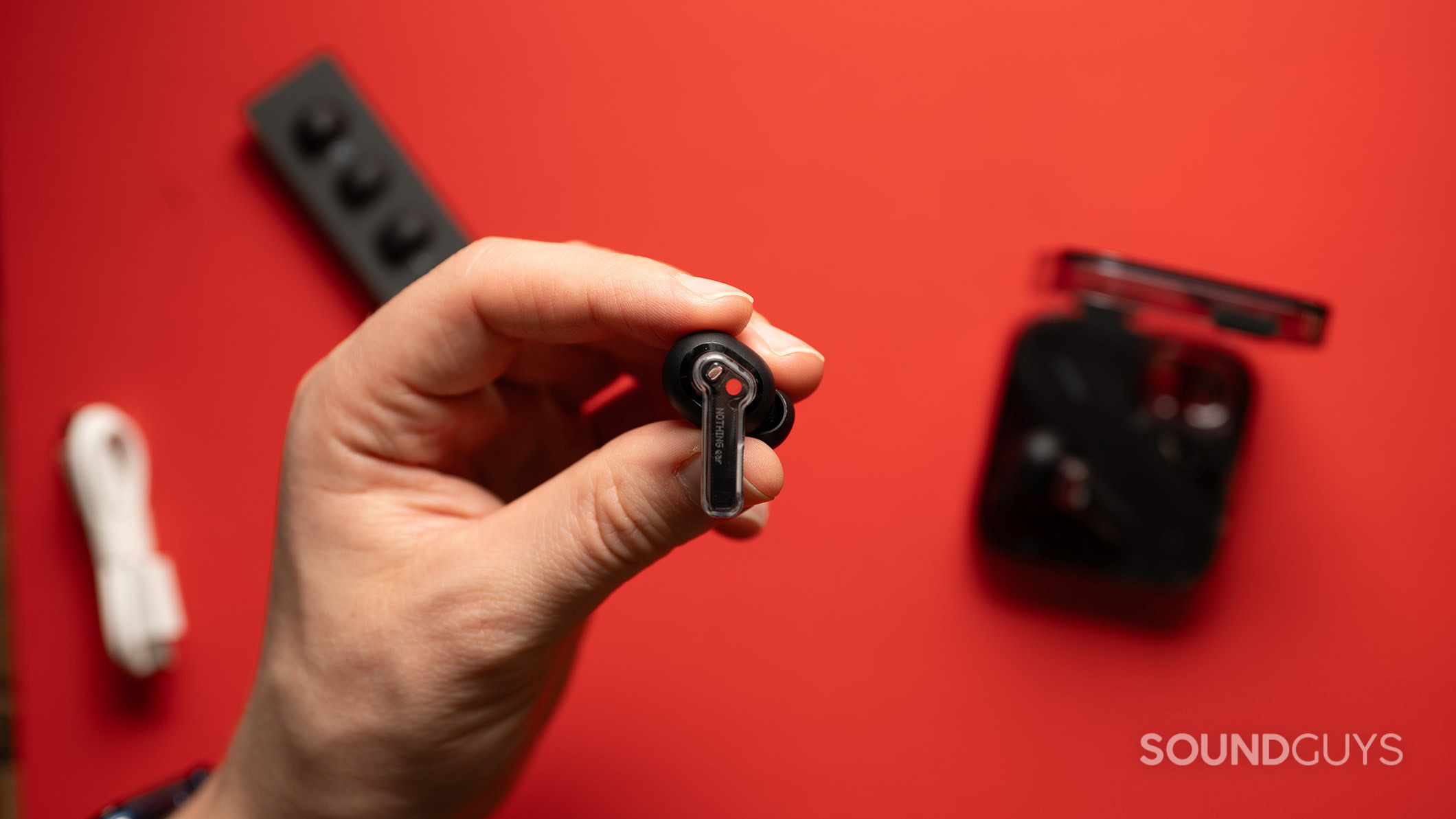
At just $149, the Nothing Ear earbuds punch well above their weight class in terms of features and performance. Nothing packed the Ear with premium specs like 11mm ceramic drivers that deliver outstanding sound quality with great clarity and an immersive soundstage. The advanced parametric EQ allows you to precisely tune the sound profile to your preferences. You also get support for high-quality LDAC and LHDC Bluetooth codecs.
These earbuds are packed full of features that will please casual listeners and audiophiles alike.
Despite the low price, the Nothing Ear doesn’t cut corners when it comes to features. Highlights include good active noise cancelation, a superb transparency mode, and around 8 hours of battery life with fast USB-C and wireless charging.
The feature-packed companion app provides an advanced EQ, hearing test-based sound personalization, customizable touch controls, and more. You even get a low-latency gaming mode.
While the ANC could be stronger, it’s hard to find a better total package for under $200 than the Nothing Ear. You get premium audio quality, tons of features, and a sleek, durable design at an unbeatable value.


- Battery life: 8 hours and 4 minutes of playback (up to 40 hours total with the charging case)
- Connectivity: Bluetooth 5.3 with support for LHDC 5.0, LDAC, AAC, and SBC codecs
- Water resistance: IP54 rating for earbuds, IP55 for the charging case
- Weight: 4.6g per earbud
Loading chart ...
As you can see in the chart above, the Nothing Ear has a default frequency response that amplifies low frequencies above our headphone preference curve. There is also a drop in output around 470Hz and a boost around 5.5kHz compared to our preference. You can easily equalize these variances using the advanced equalizer.
The chart below shows how the sound of the Nothing Ear was assessed by the Multi-Dimensional Audio Quality Score (MDAQS) algorithm from HEAD acoustics.
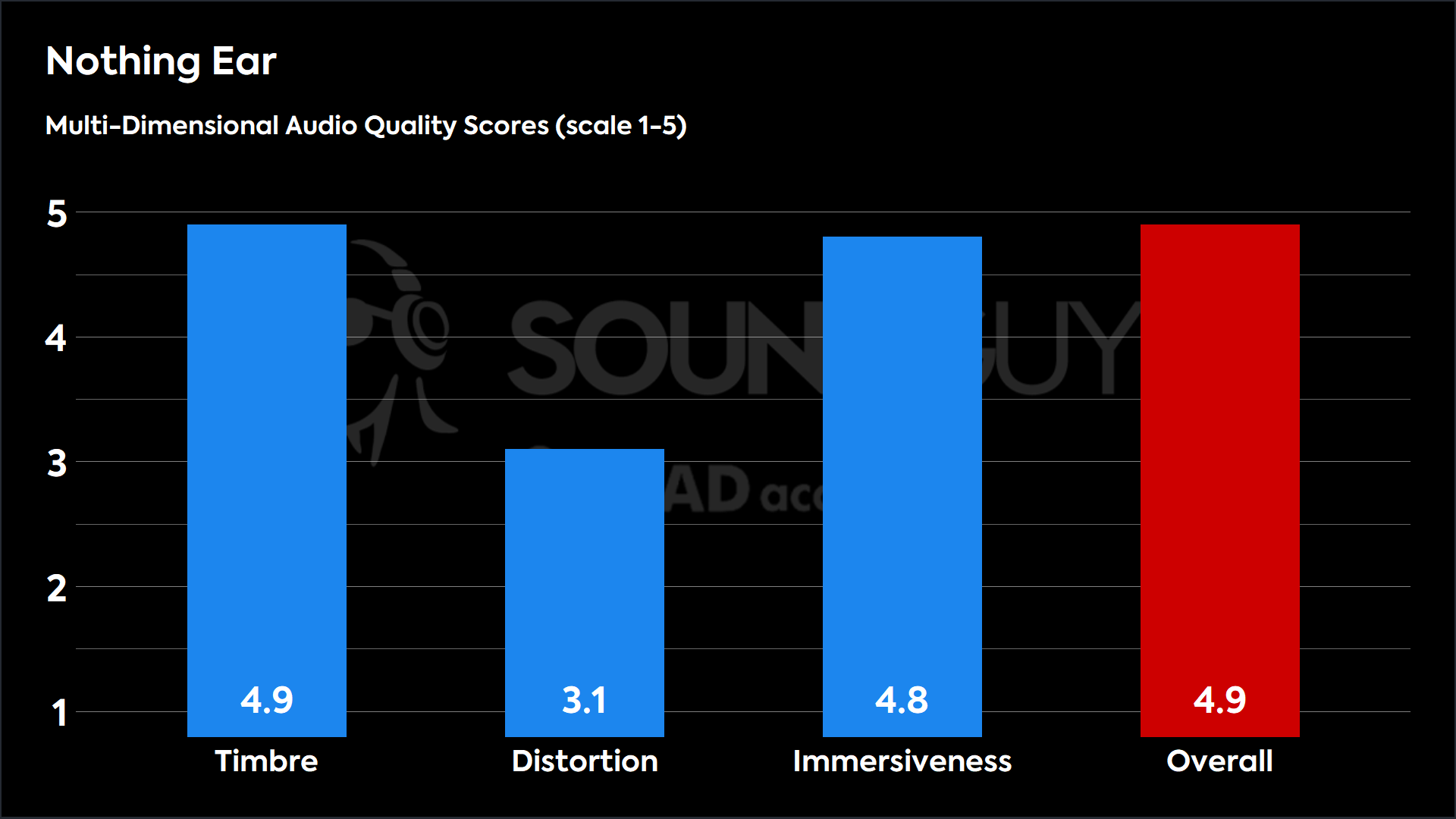
The Nothing Ear has three mics and an AI noise reduction algorithm to suppress background noise. While voices sound slightly muffled, the background noise reduction algorithm is one of the best we’ve heard. No matter where you are, the person on the other end of the line should still be able to understand what you are saying.
Nothing Ear microphone demo (Ideal conditions):
The Sennheiser Sport True Wireless Earbuds are a reliable set of workout earbuds
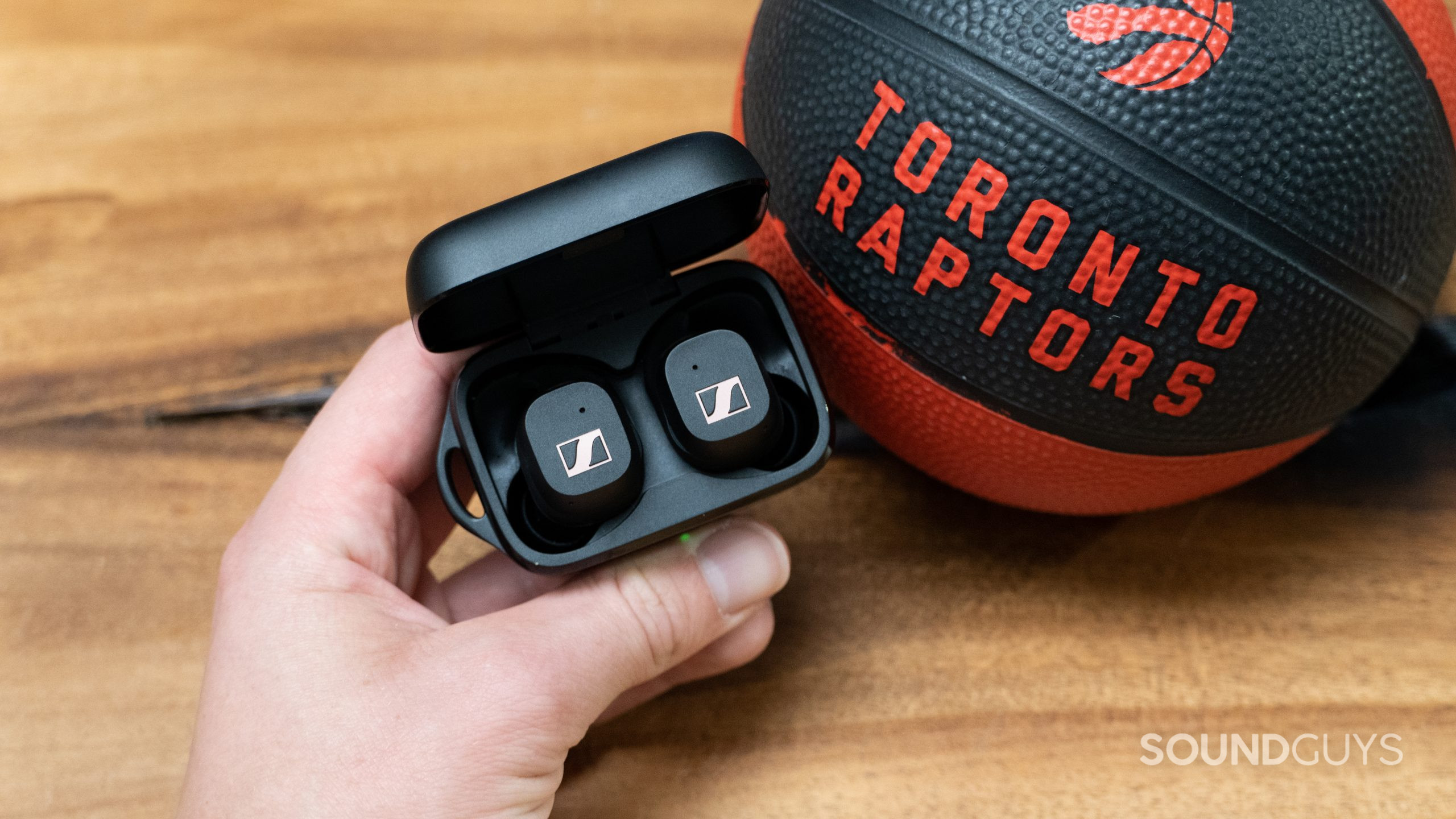
If your goal is to get an excellent pair of dedicated workout buds, the Sennheiser Sport True Wireless Earbuds have your back with a secure fit via wings and six different-sized ear tips.
If you're a runner, you'll love the Sennheiser Sport.
Like any good set of exercise-ready earbuds, the Sport Wireless Earbuds have an IP54 rating against dust and sweat. The buds’ touch controls work well, and Sennheiser’s app has EQ and adjustable commands. Plus, the frequency response is very nice, with great bass and mids response and some slight under-emphasis in the treble.
Utilizing Bluetooth 5.2, Sennheiser ensures you get a good selection of codecs, including aptX (for Android users), AAC (for iOS), and SBC. With a battery life of 7 hours, 13 minutes, and two additional charges, these will outlast pretty much any hike or marathon you throw at them.

The frequency response of the Sennheiser Sport closely follows our headphone preference curve. While the earbuds slightly emphasize bass more than treble, most people will enjoy the sound of these workout buds. If not, it’s easy enough to adjust the sound from within the Smart Control app or a third-party EQ app instead.
The Beats Studio Buds Plus are a great budget pick
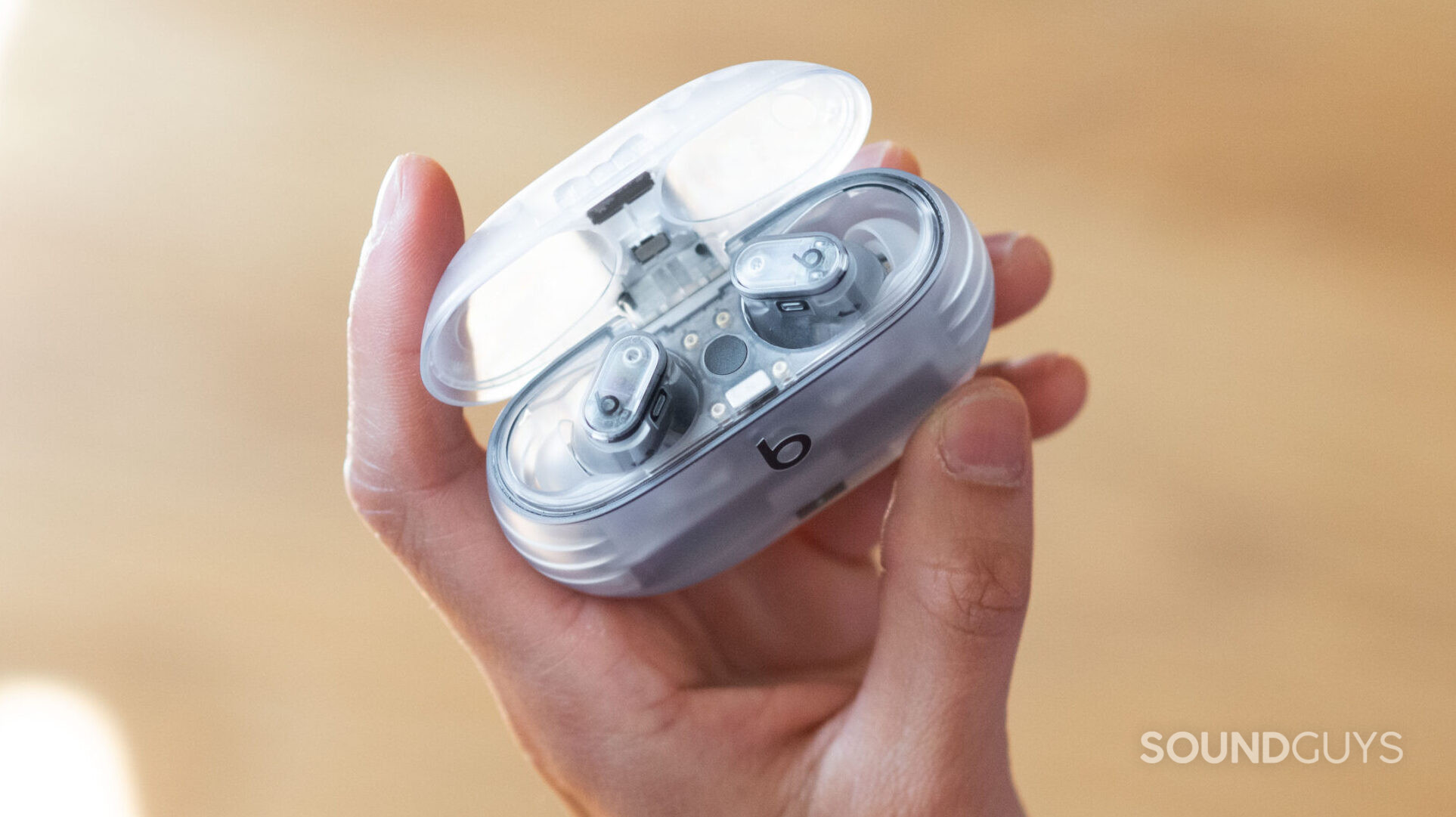
Updating the successful formula of the Beats Studio Buds are the Beats Studio Buds Plus. Despite belonging to the Apple empire, the Studio Buds Plus works just as well with Android as they do with iOS. They come with good ANC for less than the AirPods Pro (2nd generation), too.
One of the standout features of the Beats Studio Buds Plus is the battery life, which reaches a very impressive 8 hours and 22 minutes with ANC enabled. The noise canceling works where it counts, in filtering out low-frequency noises, and the passive isolation is pretty good, too.
While the tuning of the Studio Buds Plus is a bit more low-end than our ideal, it’s far better for most music than older Beats, which were really bassy. Beats include the standard AAC and SBC codecs, which is fine for most. There’s an app as well, but besides updates, it doesn’t do much, and if you’ve got an iPhone, it’s all integrated into your settings instead. The only bugaboo to keep in mind is that the Studio Buds Plus uses buttons and not touch controls, which can interfere with your fit.

The Grell Audio TWS 1 sounds as great as it looks
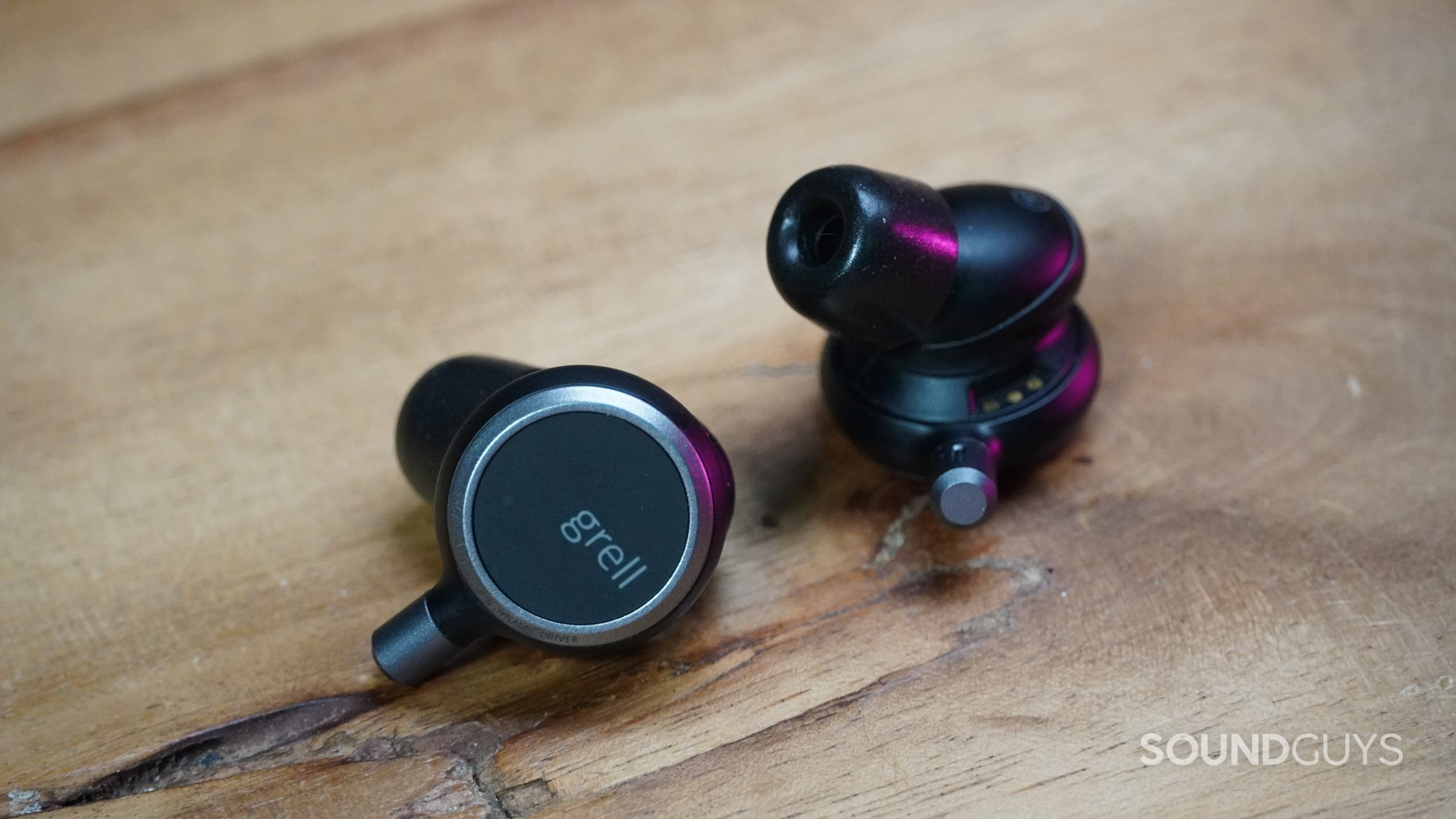
Former Sennheiser chief headphone engineer Axel Grell has a new project: the Grell Audio TWS 1 active noise canceling wireless earphones. If you’re an audiophile who wants Bluetooth earbuds that put sound quality first, the TWS 1 is a solid contender. Right out of the box, these earphones sound great, and you can take the sound quality a step further with the SoundID app. Not only can you let Sonarworks’ software create a custom sound built around your hearing abilities, but you can also create a granular custom EQ of your own.
Sound quality aside, these earbuds have a beautiful design with Gorilla Glass-covered touch panels that allow you to control playback and field calls like most wireless earphones. The large panels make for an easy target, so you shouldn’t have to deal with misfires often. The charging case is fairly large to accommodate the earphones, though, which may be a turn-off to those with particularly small bags or pockets.
Grell Audio’s active noise canceling and “noise annoyance reduction” (NAR) effectively combats background noise, but it isn’t technically the most effective ANC on the market, which is purposeful. NAR constantly adjusts the ANC intensity based on how loud your environment is so that it sounds more natural and less jarring, which some listeners experience with other top-tier ANC headsets. The foam ear tips do a great job of handing frequencies higher than 1kHz, so you shouldn’t hear much in the way of generic room noise like chatter.

No ANC? No problem with the Jabra Elite 4
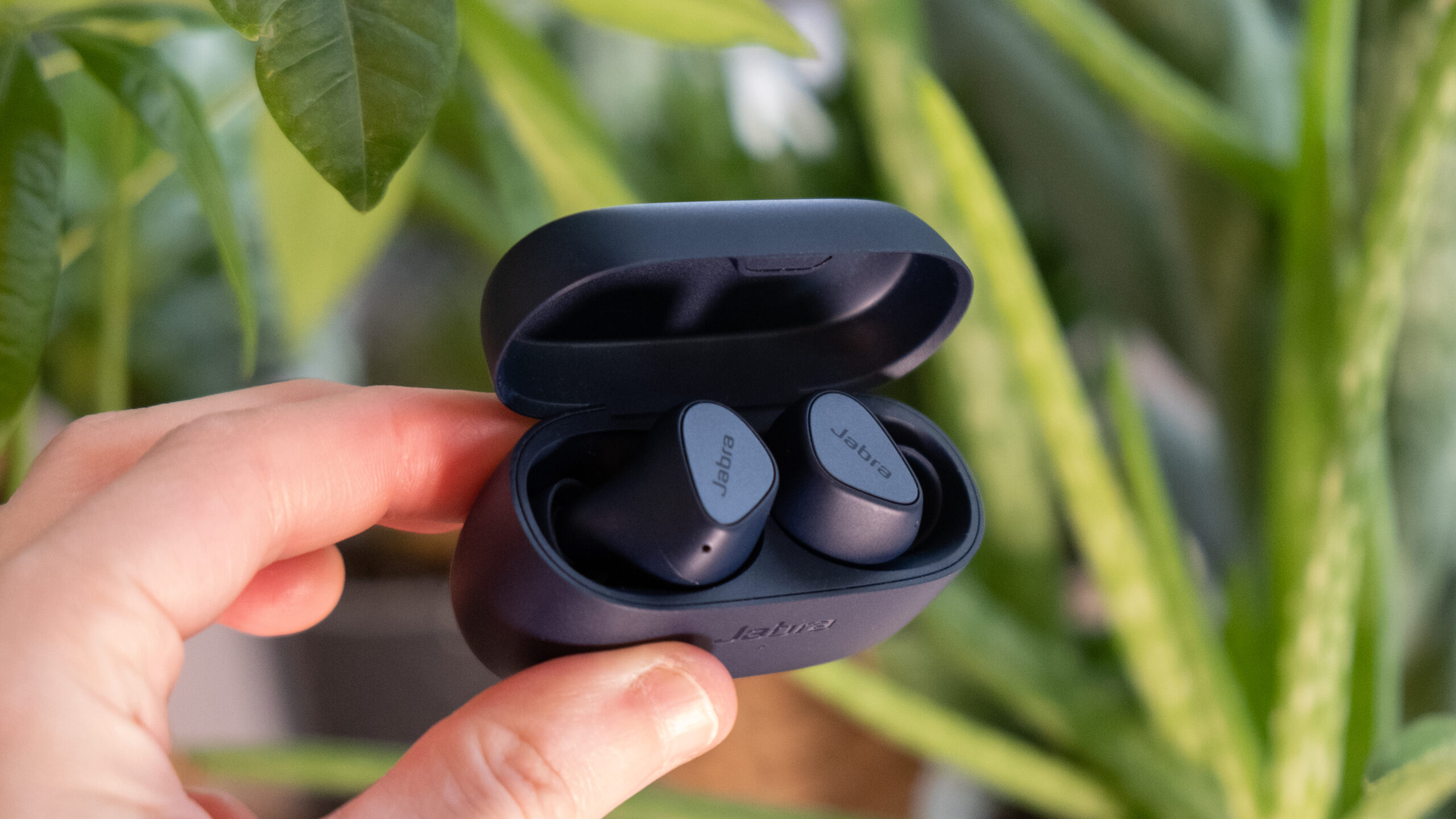
If you don’t need ANC and just want some reliable earbuds that sound good, try the Jabra Elite 4. By default, these earbuds supply a good frequency response (and the app has EQ too). The Elite 4 utilizes aptX and SBC codecs, which is solid for Android users, although not ideal for iOS. While Jabra also has the exercise-oriented Jabra Elite Active 4, the non-active model still has a robust IP55 rating and improved isolation properties. Uniquely, Jabra designed the Elite 4 with a Goldilocks combination of functionality, pricepoint, and sound. Best of all, it’s well under $200.


The best wireless earbuds under $200: Notable mentions
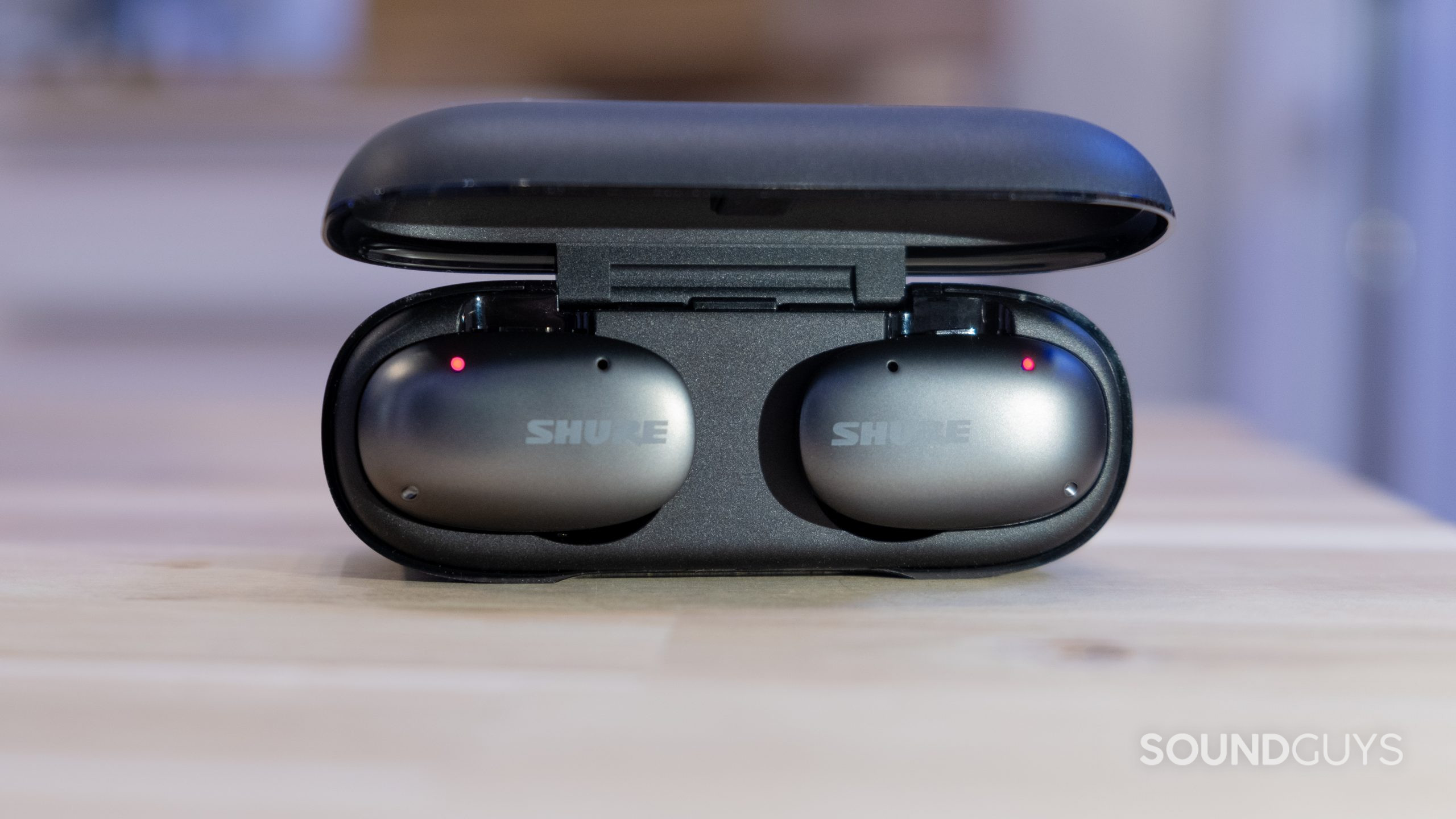
- Anker Soundcore Space A40: These budget-minded earbuds have a lot of great features, such as ANC for a cut price of $79 at Amazon.
- Beats Fit Pro: These buds feature stabilizers to keep them in your ears and come in a myriad of colors, too (for $159 at Amazon). They can be fussy with some Android devices, but in-ear detection and a decent ANC rate as some of their upgraded features.
- Beats Powerbeats Pro: Beats workout earbuds have an IPX4 rating, secure ear hook design, and battery life (10 hours, 52 minutes). You need a Lightning cable to charge the case, which may be frustrating for those who don’t use Apple products. Still, the Powerbeats Pro is generally for iPhone owners since it has the same H1 chip as the AirPods Pro. Try it for $159 at Amazon.
- Bose Sport Earbuds: These stalwart earbuds have been around for a couple of years and do all the exercise tasks you might throw at them well. Importantly, they grip your ears with stabilizers and sound pretty good, too. Pick them up for $165 at Amazon.
- Bose Sport Open Earbuds: These are for the person who does not want or need ANC. In fact, this person wants to hear everything. With such a niche set of earphones, the Bose Sports Open keeps you aware while you exercise and provides a stable fit (for on the product’s website). It supports only AAC and SBC codecs, and the case doesn’t provide battery charging.
- Google Pixel Buds A-Series: This headset is ideal for Google Pixel phone owners and Android phone owners at large. You get a pretty consumer-friendly sound when you enable the boosted bass EQ mode, and the default frequency response is great for spoken word content like audiobooks or podcasts. These sell for $94 at Amazon.
- Jabra Elite 7 Pro: Durable noise canceling earbuds with tons of customization from the Jabra Sound+ app. The Jabra Elite 7 Pro checks almost all the right boxes for $199 at Amazon.
- Jaybird Vista 2: If you plan on running over your earbuds while dunking them in mud, the Vista 2 sports IP68 and MIL-STD-810G certifications. The price teasingly sits just below $200 ($117 at Amazon), which is why it’s here. However, you get good sound quality and a comprehensive app. Great isolation and above-average ANC make the Vista 2 a solid alternative.
- JBL Tune Buds ($69.95 at Amazon): If you are able to get a good fit with the JBL Tune Buds, you will enjoy using these earbuds. They are packed full of features and have a sound quality that most people like.
- OnePlus Buds Pro 3 ($199 at OnePlus): The OnePlus Buds 3 Pro have a lot of attractive features but have limited availability. If you can get them, they are worth the money.
- Sennheiser CX Plus True Wireless: This pair of wireless earbuds bring great noise canceling at a reasonable price ($89 at Amazon). You don’t get many extras with these earbuds, but Sennheiser makes sure that all music sounds good through this headset with its neutral-leaning frequency response.
- Sennheiser MOMENTUM True Wireless 3: The third time is the charm with the MTW line of earbuds from Sennheiser. On this go, Sennheiser includes stabilizing wing tips and support for aptX Adaptive. This is a great pair of earbuds for listeners who value sound quality and ANC, but the price makes it a bit cost-prohibitive ($169 at Amazon).
- Shure AONIC Free: If you don’t like noise canceling or just don’t want it, the AONIC Free from Sennheiser is a great headset (for $199 at Amazon). These earbuds feature narrow-diameter nozzles and comfortable memory foam ear tips. The headset does a great job of blocking out noise without the need for ANC. You still get great Sennheiser sound and build quality, along with an excellent software experience on any mobile OS.
- Sony LinkBuds S: These subtle-looking earbuds feature excellent ANC and a solid frequency response curve with LDAC and AAC. Check them out for $148 at Amazon.
- Sony WF-C500: This fresh pair of wireless earbuds from Sony feature DSEE upsampling and an IPX4 rating. Listeners get many of the same bells and whistles as the premium Sony WF-1000XM4 for less than half the price, $98 at Amazon.
What you should know about wireless earbuds under $200
How long do wireless earbuds last?
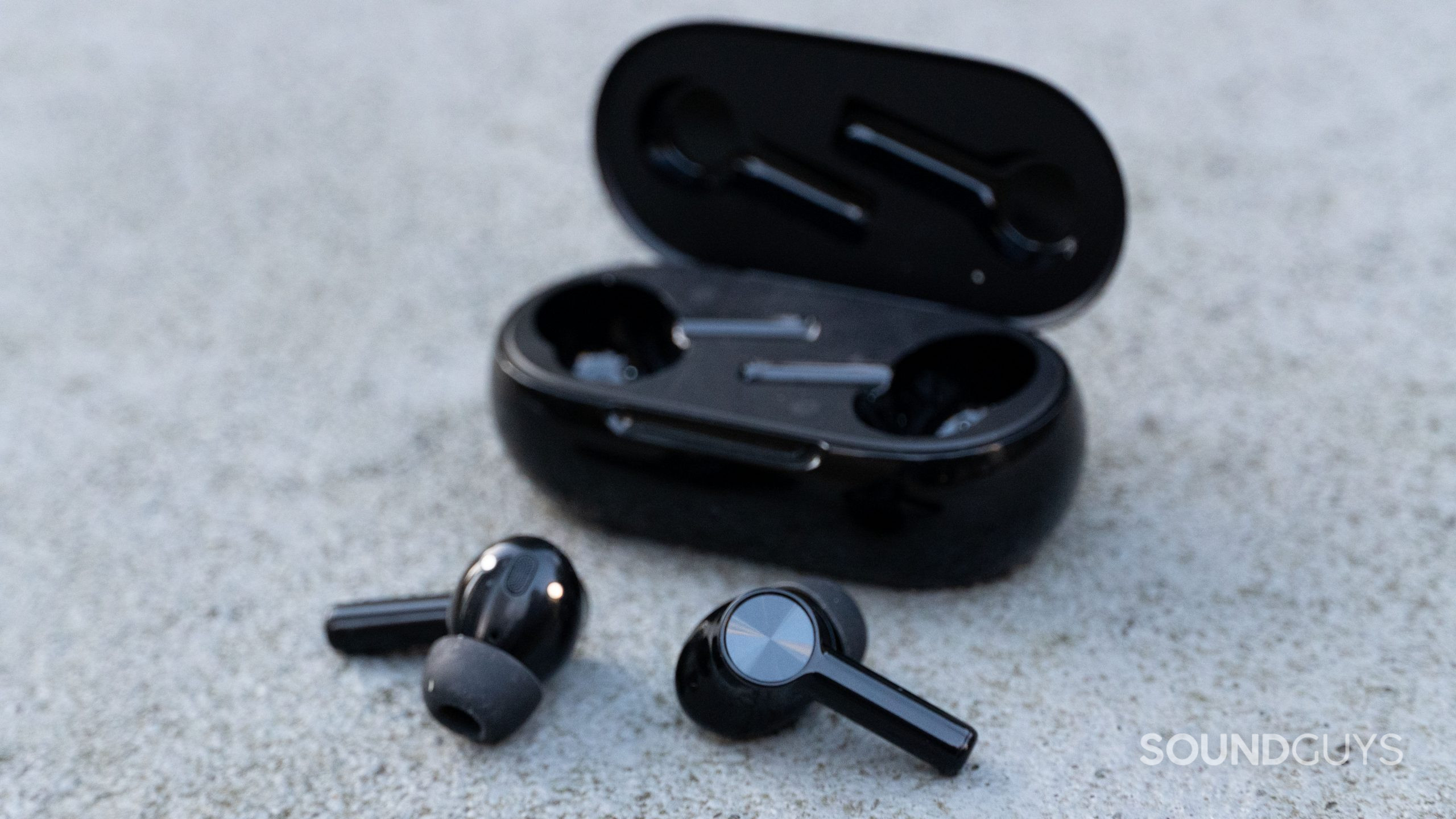
This seemingly simple question has a few answers. On average, most wireless earbuds have a standalone battery life of between four and six hours, with the charging case providing an extra two or three charge cycles. In other words, you can get anything from 12 to 24-plus hours of battery out of your true wireless earbuds and the case before you need to recharge them.
While battery life is still the Achilles’ heel of any wireless product, some manufacturers have an ace up their sleeves. Many cases can quickly charge your earbuds. You’ll commonly see specs like 10 minutes of charging provides 60 minutes of listening. Some manufacturers, like OnePlus, go above and beyond with their fast charging speeds, but most stick to the “10 minutes yields one-hour” standard. It’s a stat worth checking because you want to listen and not wait around for your buds to charge.
The “IP” in IP rating stands for ingress protection, essentially how protected a device is from dust and water damage. The higher the number that follows the IP rating, the more durable your product is. Often, you’ll see earbuds with an IPX4 rating. The “X” is a placeholder for a dust-resistant rating, and the “4” corresponds to a level of water resistance.
You can read our in-depth breakdown of IP ratings, but if you don’t have time, IPX2 is fine for light use every day. If you’re going to exercise in your earbuds, we recommend something with at least an IPX4 rating.
What are Bluetooth codecs?
Bluetooth codecs help make the difference between an okay sound and a very good sound, and here’s your friendly reminder that the headphone jack is still the queen of quality. Codecs allow your smartphone or laptop to communicate with your headset. Every Bluetooth audio device supports SBC by default, so at the very least, your earbuds can stream over that. If you’re steeped in the Apple ecosystem, all you need to know is AAC is your codec of choice.
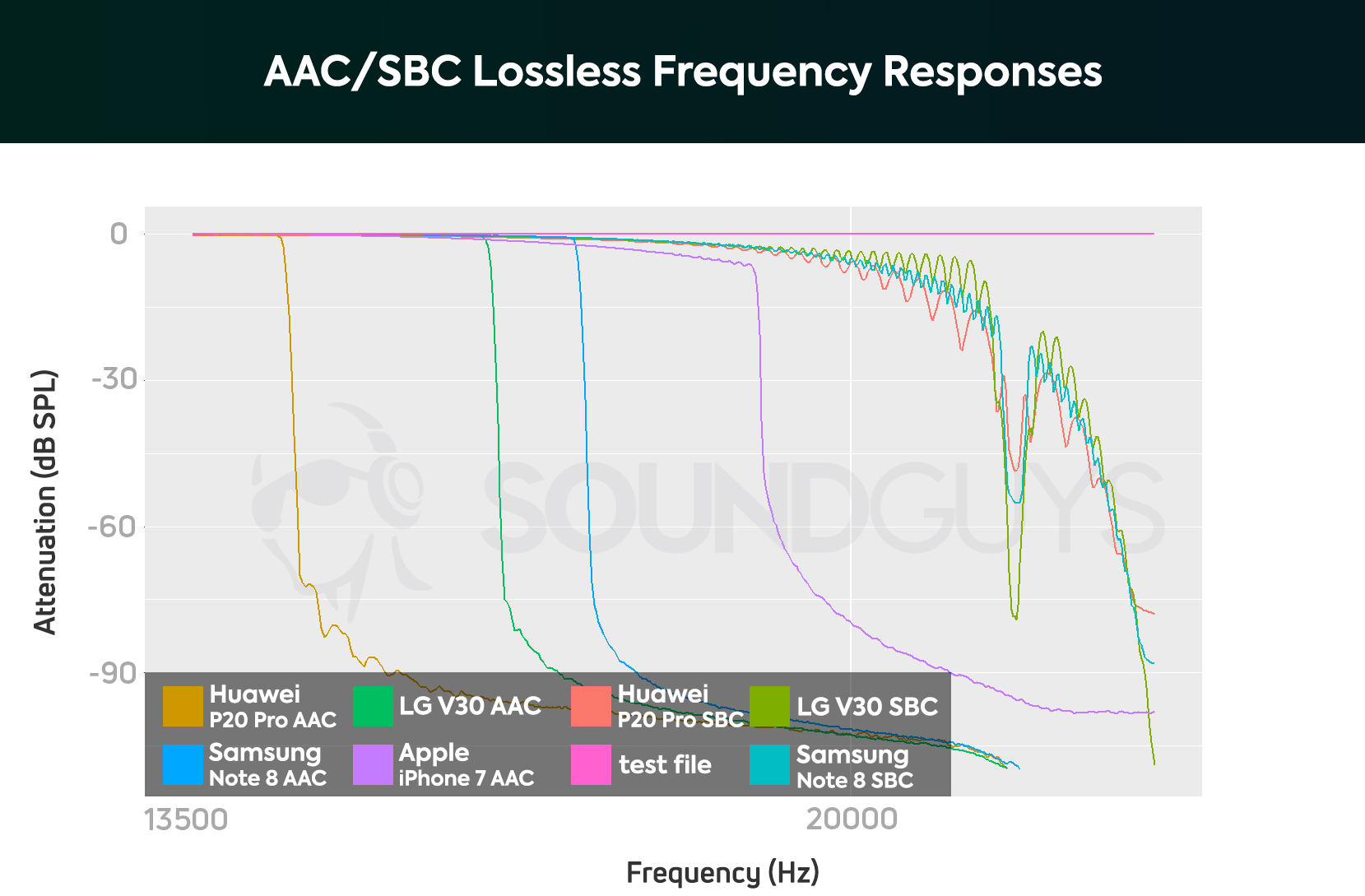
For Android users, the situation seems more nebulous and dependent on both your device and your use case. If the earbuds in question only have AAC and SBC, sometimes you get better quality results with SBC. Otherwise, to reduce latency (which is a real bugaboo with Bluetooth and video), look for higher resolution options like aptX or aptX-LL. Some manufacturers (similar to Apple) have chosen to optimize for their own ecosystem. Samsung’s proprietary codec works best with other Samsung products.
Basically, pay attention to codecs. SBC might be a one-size-fits-all situation, but maybe you want some tailoring.
What is a frequency response?
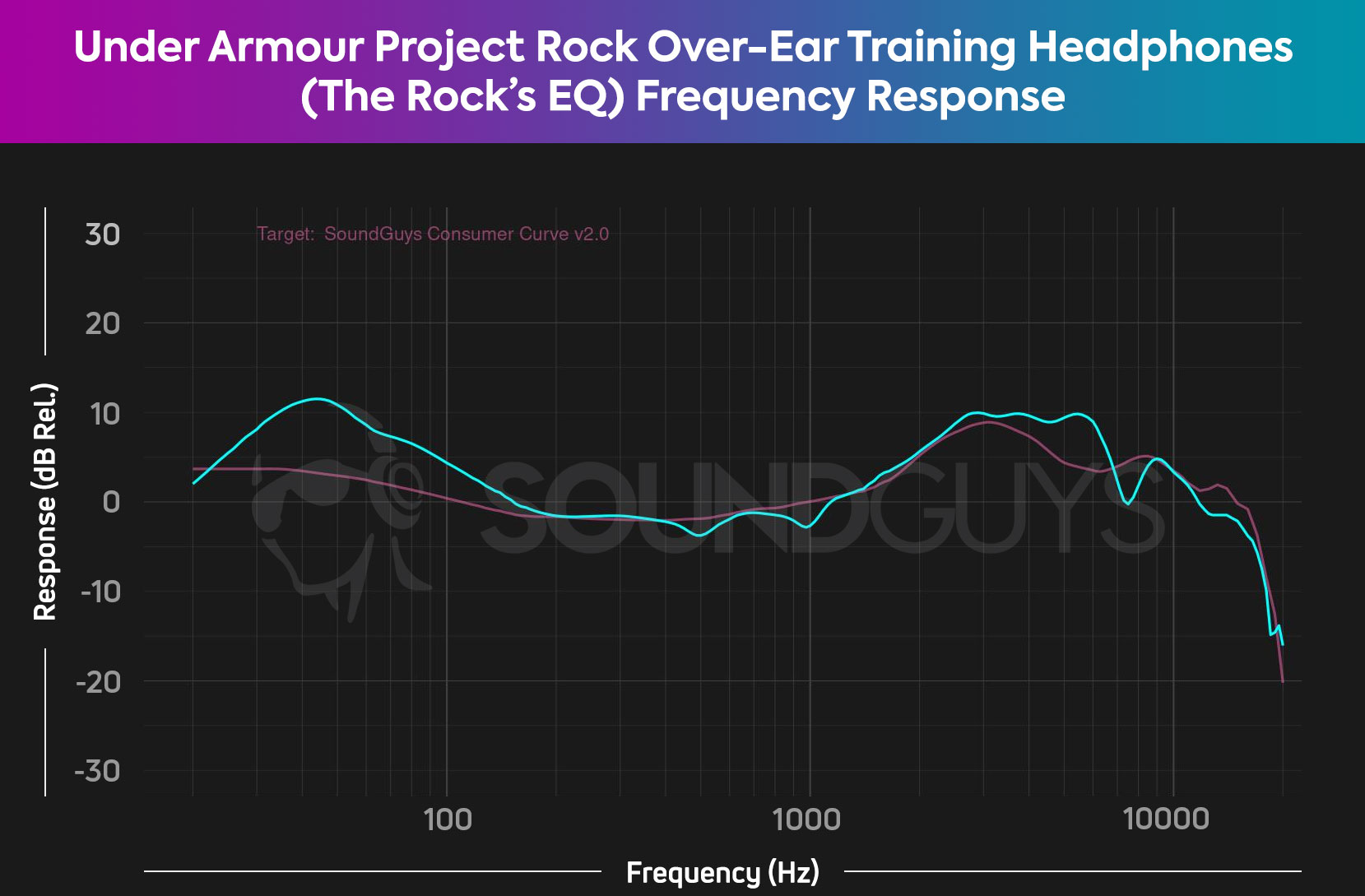
If you’ve poked around our site enough, you’ve probably seen frequency response charts. Basically, we measure how closely an audio product reproduces sound relative to our house curve (consumer or studio). In our updated frequency response charts, cyan represents the product in question, and the pink line represents the SoundGuys curve. Although many people prefer a studio or “flat” response, most of us average listeners like a bit more bass and treble in our tunes. You can read more about the SoundGuys house curves, but the gist is that this is what works well for most people.
A good frequency response is one that does not unduly hide other frequencies by being too loud. In other words, if bass sounds are too loud, you probably can’t hear quieter sounds of other frequencies as well. That’s how human brains work. We just don’t process quieter sounds as well as louder ones. This often results in folks turning up the volume, and you want to keep your hearing, right?
Why does fit matter?
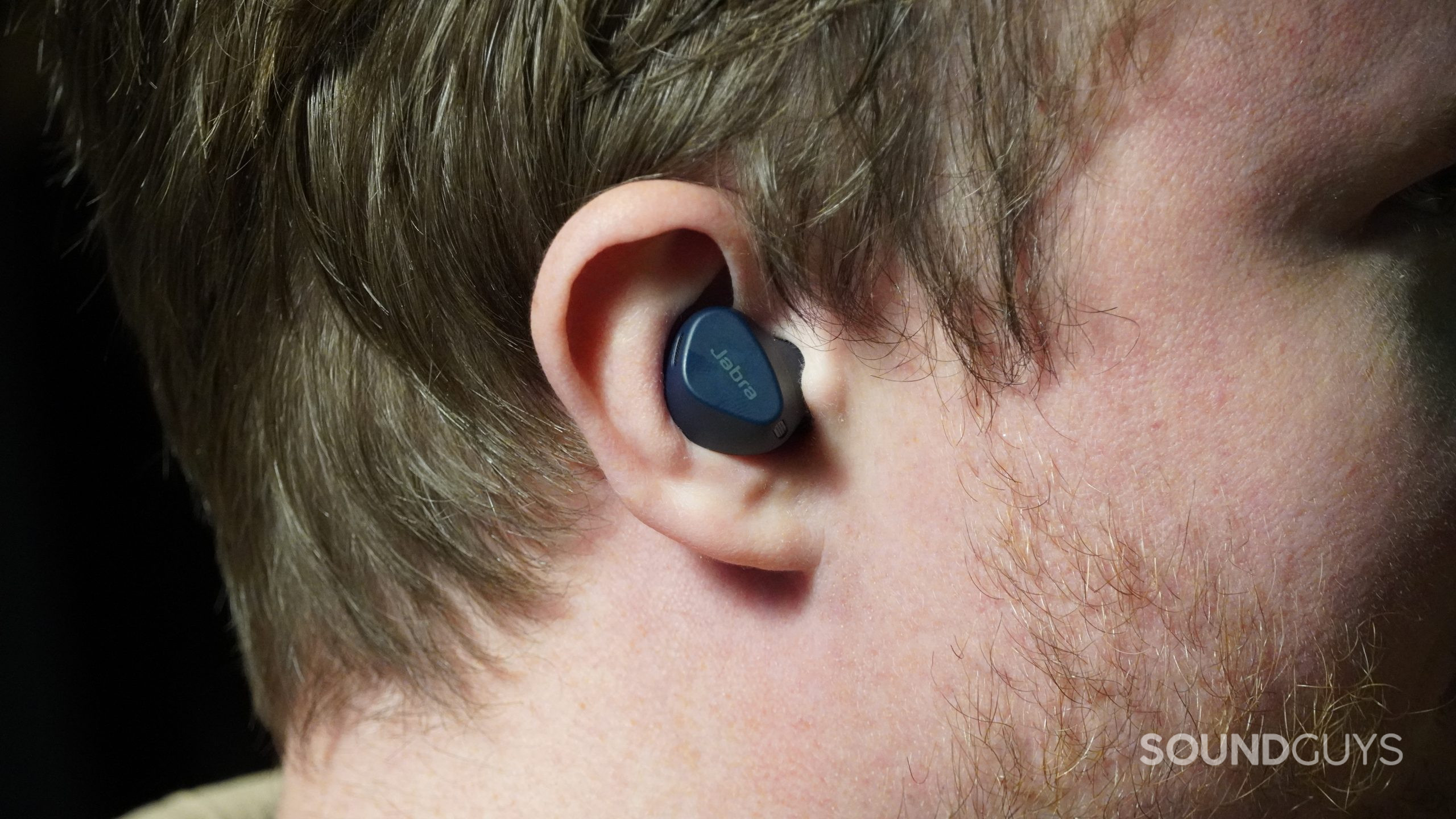
A contributing factor in finding the perfect true wireless earbuds has to do with fit. Fit matters because we can post about all sorts of awesome features, but none of them make a difference if the buds fall out of your ears. More often, the topic of fit means something more subtle. Do the buds adequately seal your ear? A poor fit actually alters your perception of the frequency response.
Fortunately, most earphones ship with a selection of different-sized ear tips. When in doubt, try a third-party option. We also typically include ear tip measurements when reviewing a product so you can compare it to what you already have.
Any product with an equalizer (EQ) is worth its weight in gold (which might not be much, considering truly wireless earbuds are fairly light). You can rescue a default frequency response you don’t like by using an EQ to make corrections—some products even feature a mobile app that has an EQ. If you hear too much bass, simply drop the EQ slider in the bass frequencies down to offset it.
What is isolation/active noise canceling (ANC)?
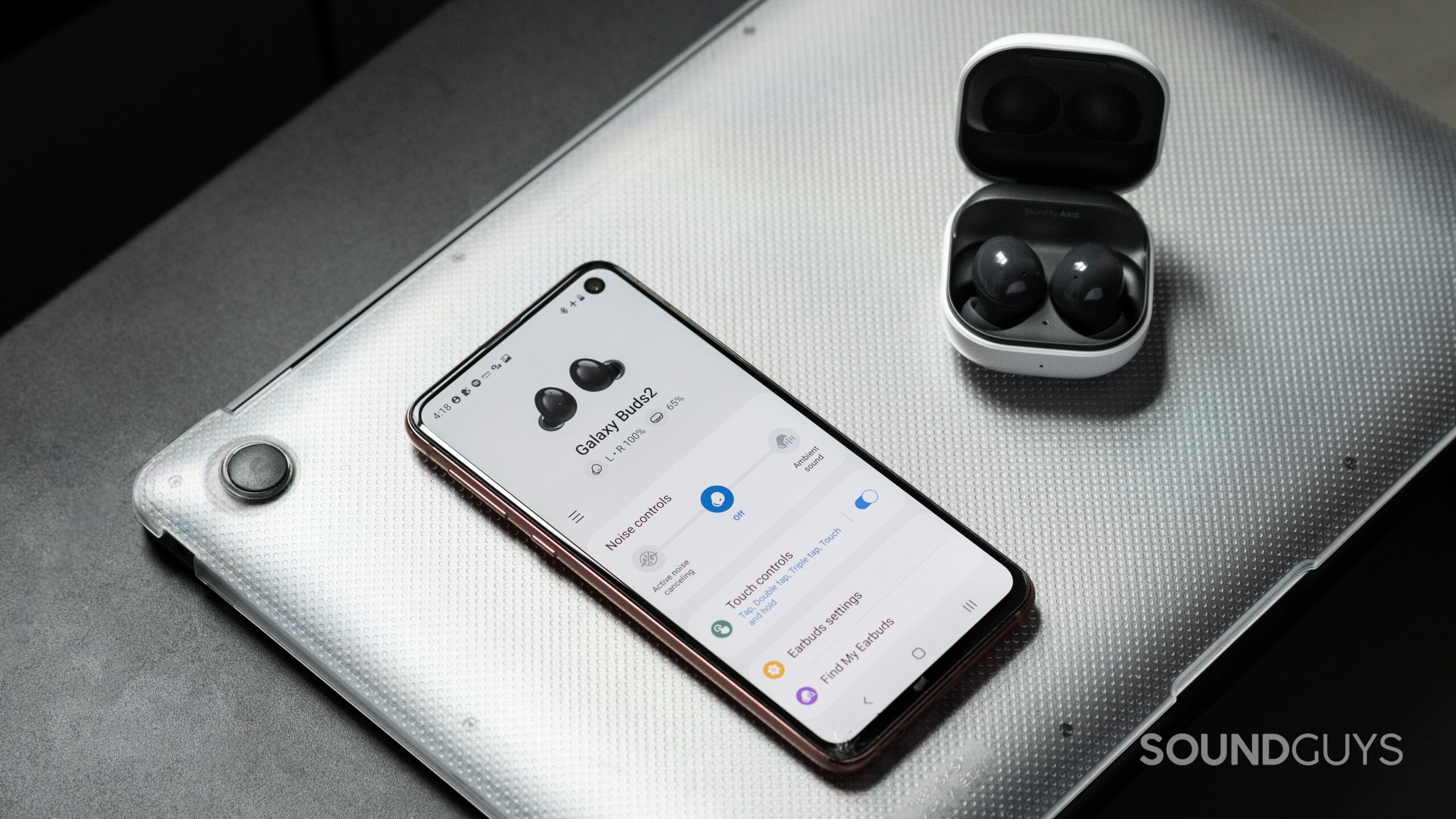
Remember know how fit matters for hearing things correctly? It also matters for achieving isolation. Isolation works much in the way that earplugs do: by creating a physical barrier between your ears and the noisy world. Inherently, some designs isolate better than others. Sometimes, that’s so you can hear your surroundings out of safety. Isolation works best typically for higher-pitched incidental sounds, like clangs in a café.
Active noise cancellation uses microphones that detect your environmental surroundings and basically use the opposite soundwaves to cancel the noise out. Frequently, there is a small delay while it detects the environmental noise. For that reason, ANC fights droning sounds best because it is somewhat predictive in nature. A fast, brief burst of sound is typically too quick for ANC to dramatically quiet it, hence why isolation is the best tool for clangs. ANC is your friend for airplanes, as it typically works on repeating sounds that land in lower frequencies.
How we choose the best wireless earbuds under $200
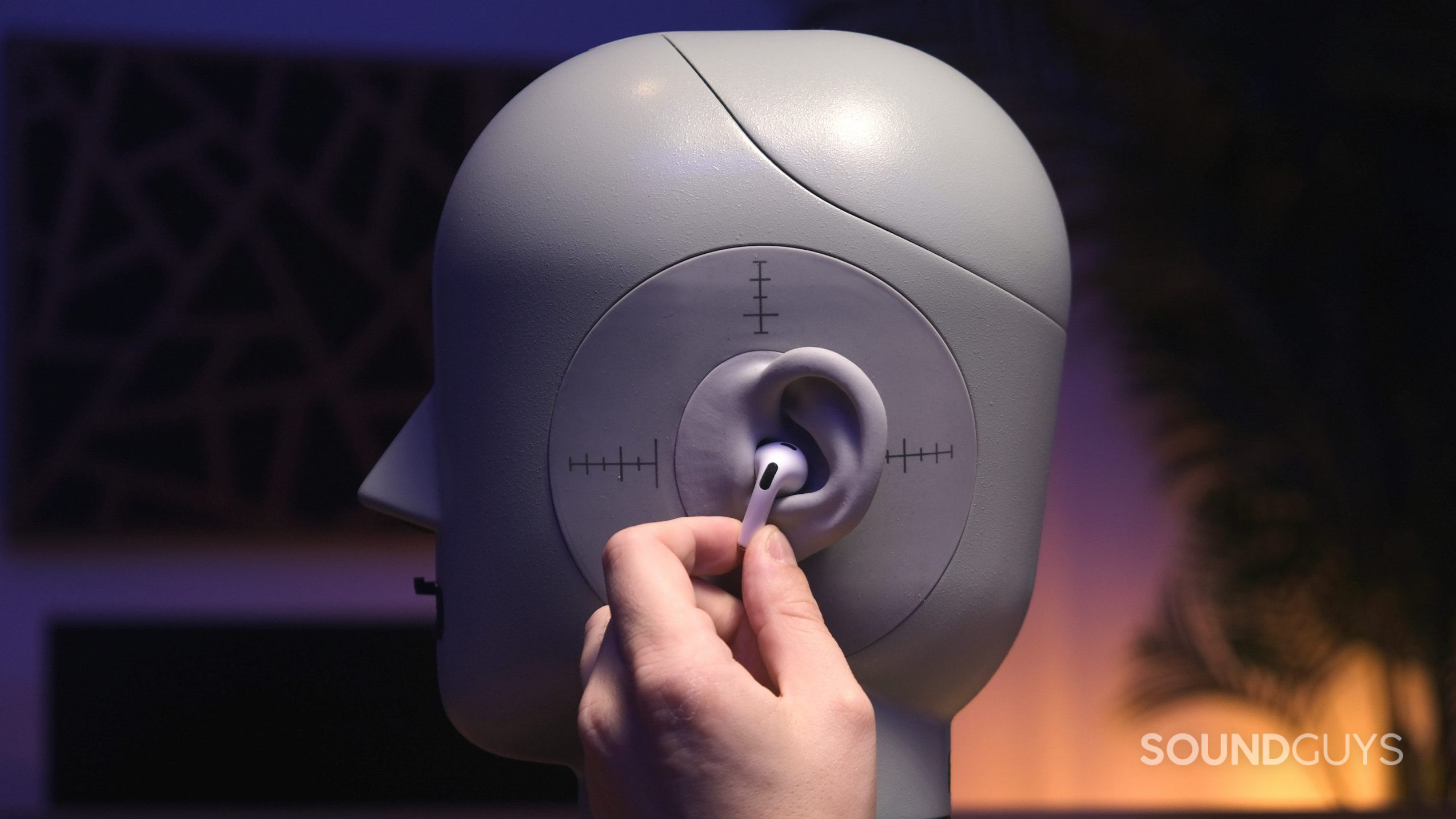
At SoundGuys, we perform objective tests to measure things like frequency response, isolation, microphone quality, and more. In order to do so, we use a Bruel & Kjaer 5128 head and torso simulator (HATS) with an anatomically realistic ear canal and outer ear. We also use a standardized setup to test the microphone quality of products with pre-recorded phrases from a calibrated artificial mouth in our test chamber. This allows us to present standardized microphone samples to you so you can judge the quality of various products and compare them across the board. After we collect all of this data, we then score each product through a variety of objective and subjective measures.
Our team then confers with one another regarding the best products for a given category, and we present our list to you. It’s not over after we hit “publish,” though. Instead, we treat every article as a living document that we update as new and worthy products come out.
Why you should trust SoundGuys
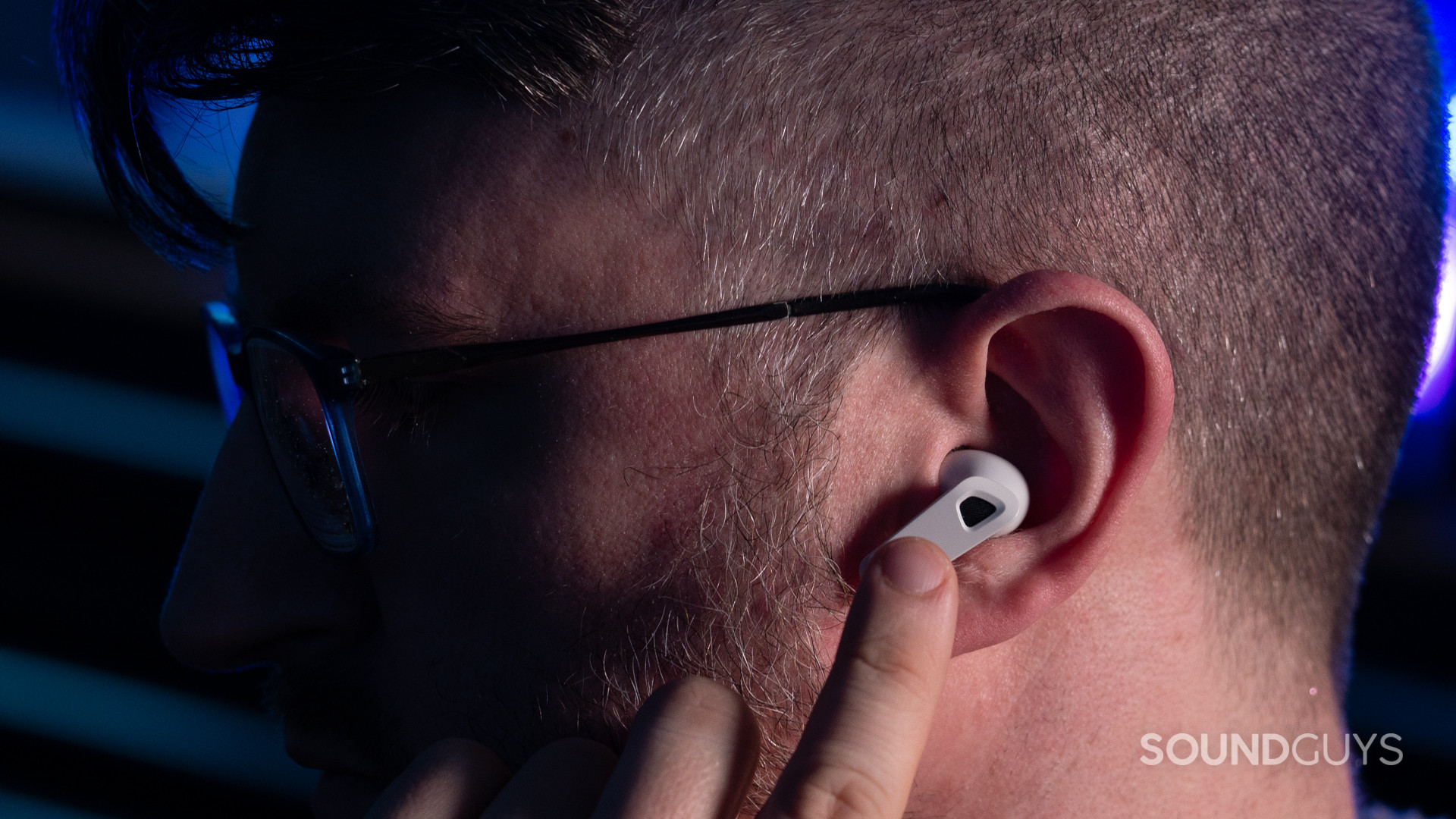
We have no ulterior motives. All of our contributors abide by a strict ethics policy. This means none of us receives compensation from manufacturers, and we don’t do direct sales. Our site features no advertisements or “hit pieces.” SoundGuys only makes money when readers choose to purchase a product through a referral link to a retailer. Because of this model, we have no financial reason to suggest or prefer one product over another.
Our recommendations are based on our years-long industry experience and each product’s merit. We use review copies of products, but none of us can keep them. Instead, we give them away or gift them to worthy causes. In other words, we do our best to provide accurate and fair content. We endeavor to correct our mistakes and constantly improve our testing methods. Our goal at SoundGuys includes making sure you are well-informed and can make the best decision for your needs.
- October 28, 2024: We added the OnePlus Buds 3 Pro as a notable mention.
- October 3, 2024: We added the Soundcore Liberty 4 Pro and the AirPods 4 with ANC to our top picks.
- July 8, 2024: We added the JBL Live Beam 3 to our top picks.
Frequently asked questions about wireless earbuds
Yes, you can use any wireless Beats earbuds with an Android phone, but you may miss out on some features. For instance, you can’t directly access Google Assistant with your voice on Android the same way you can with Siri on an iPhone when you pair the Beats Powerbeats Pro or AirPods to your device.
Beats’ earbuds are trying to bridge the gap between iPhone and Android owners, though, because the Beats Studio Buds and Beats Fit Pro work nearly as well on Android as they do on iOS. Note: the Beats Fit Pro has ANC issues that aren’t easy to resolve.
Both Jaybird and Jabra make very good wireless earbuds, and we think what it ultimately boils down to for most people is fit. The Jaybird Vista 2 housings are quite large and bulky, and the proprietary ear/wing tips make it hard to get a comfortable fit. Still, the Vista 2 stays in place during all kinds of movement as long as you’re willing to put up with some discomfort an hour into wearing it.
The Jabra Elite 7 Active is one of our favorite earbuds to date because of the excellent app experience, compact case, solid microphone, and default frequency response. If you need the most durable thing on the market, however, we recommend the Jaybird Vista 2. Both the Jaybird case and earbuds merit durability certifications.
As is the case with most technology, mid-tier products eventually receive most of the features the most expensive products have first. Grabbing the more expensive earbuds these days often means more effective ANC, better quality materials or build, surround sound, and more in-app features like location-based settings that automatically change when you leave or enter a space. Some buds under $200 have those features already, which is why it’s worth considering some of our picks. Basically, the latest and greatest is usually found in the premium earbuds first.